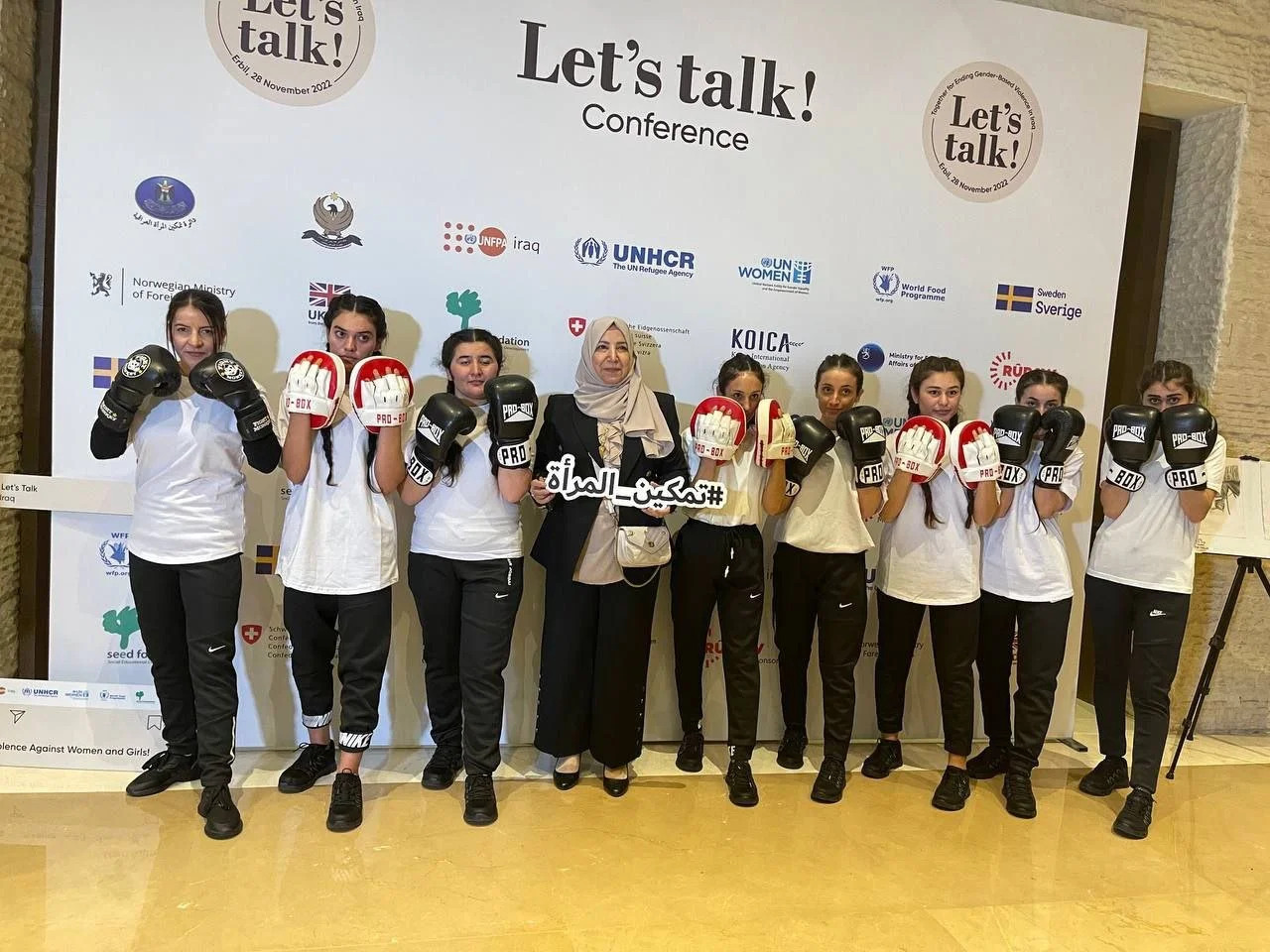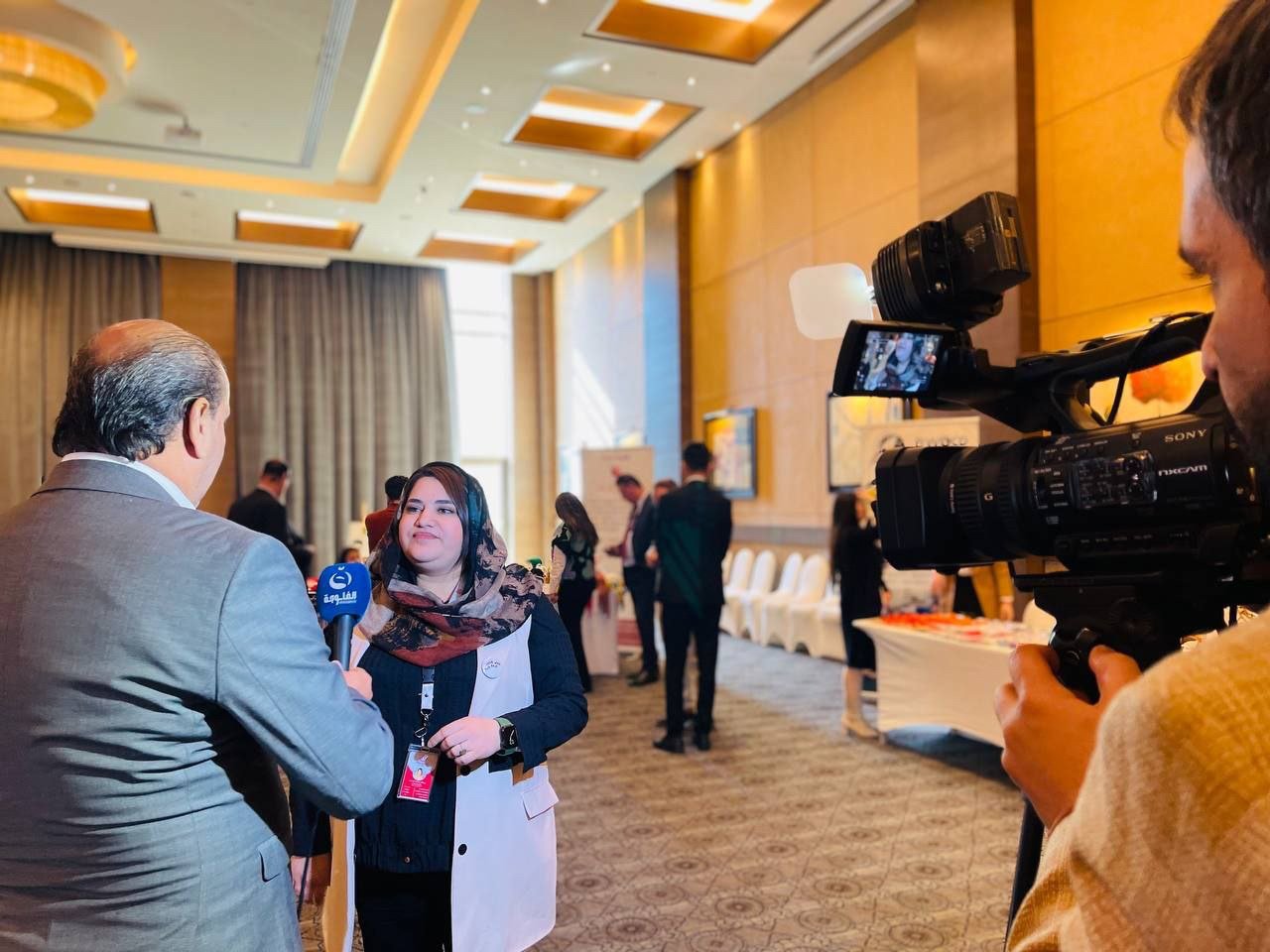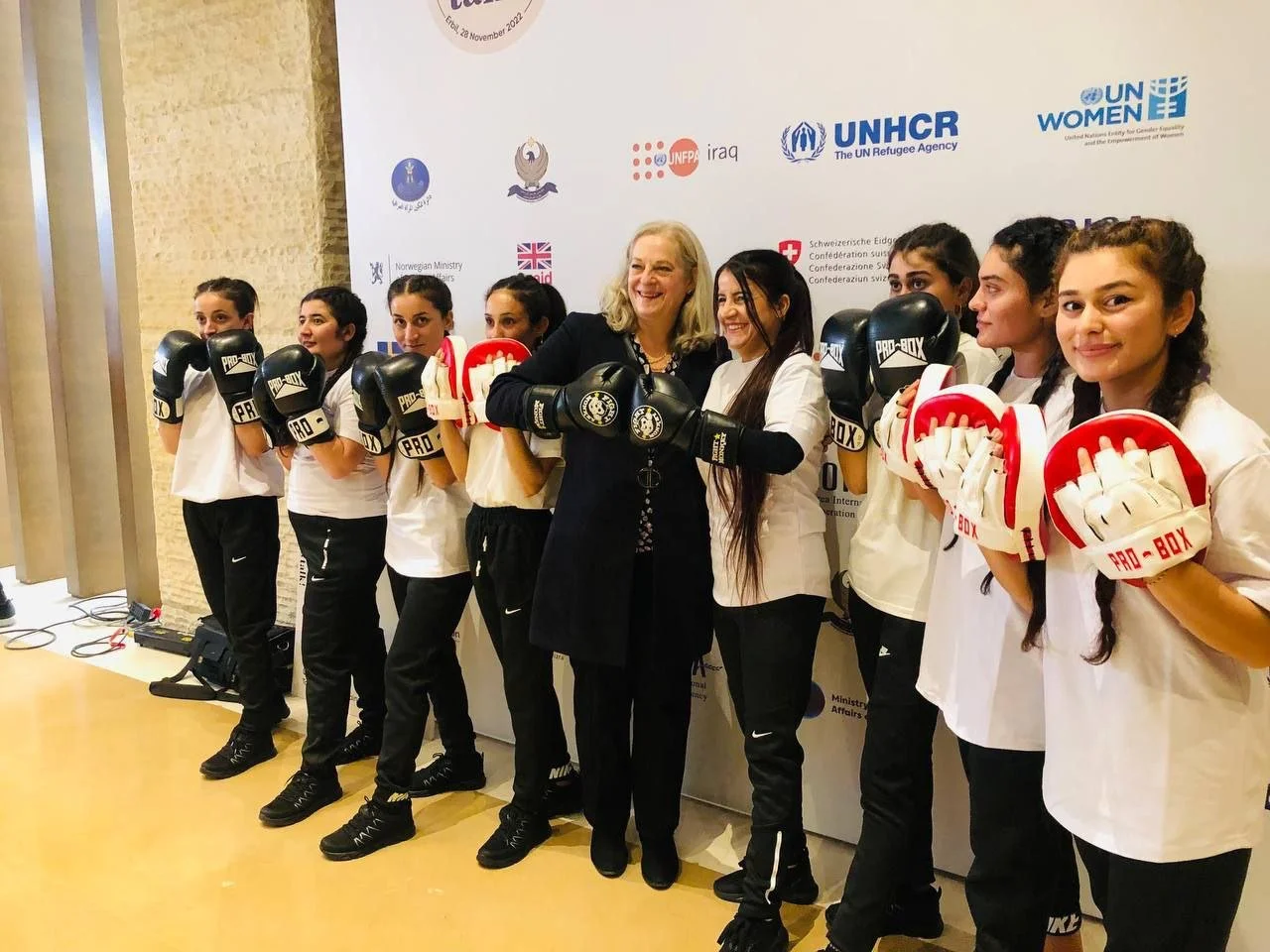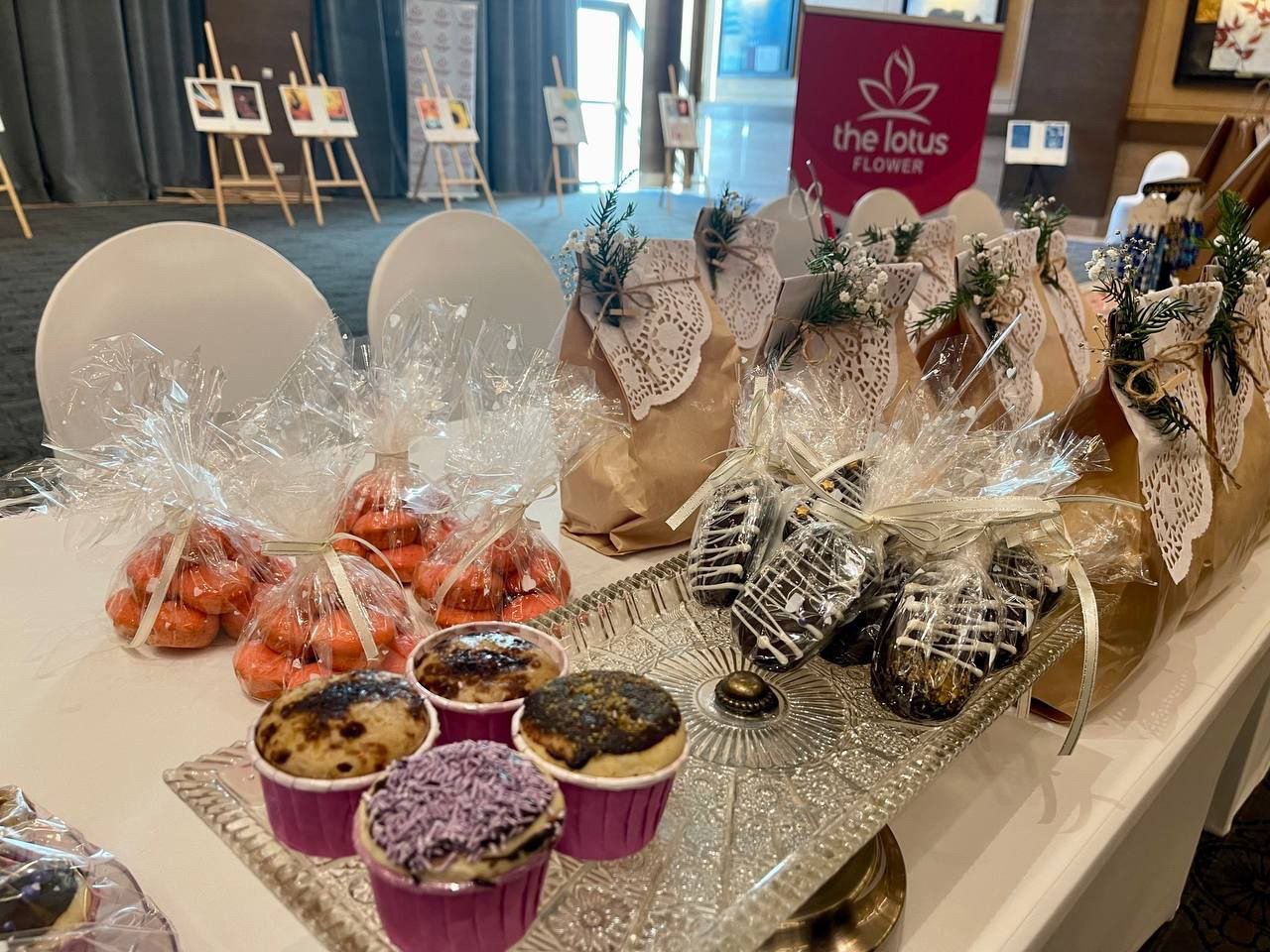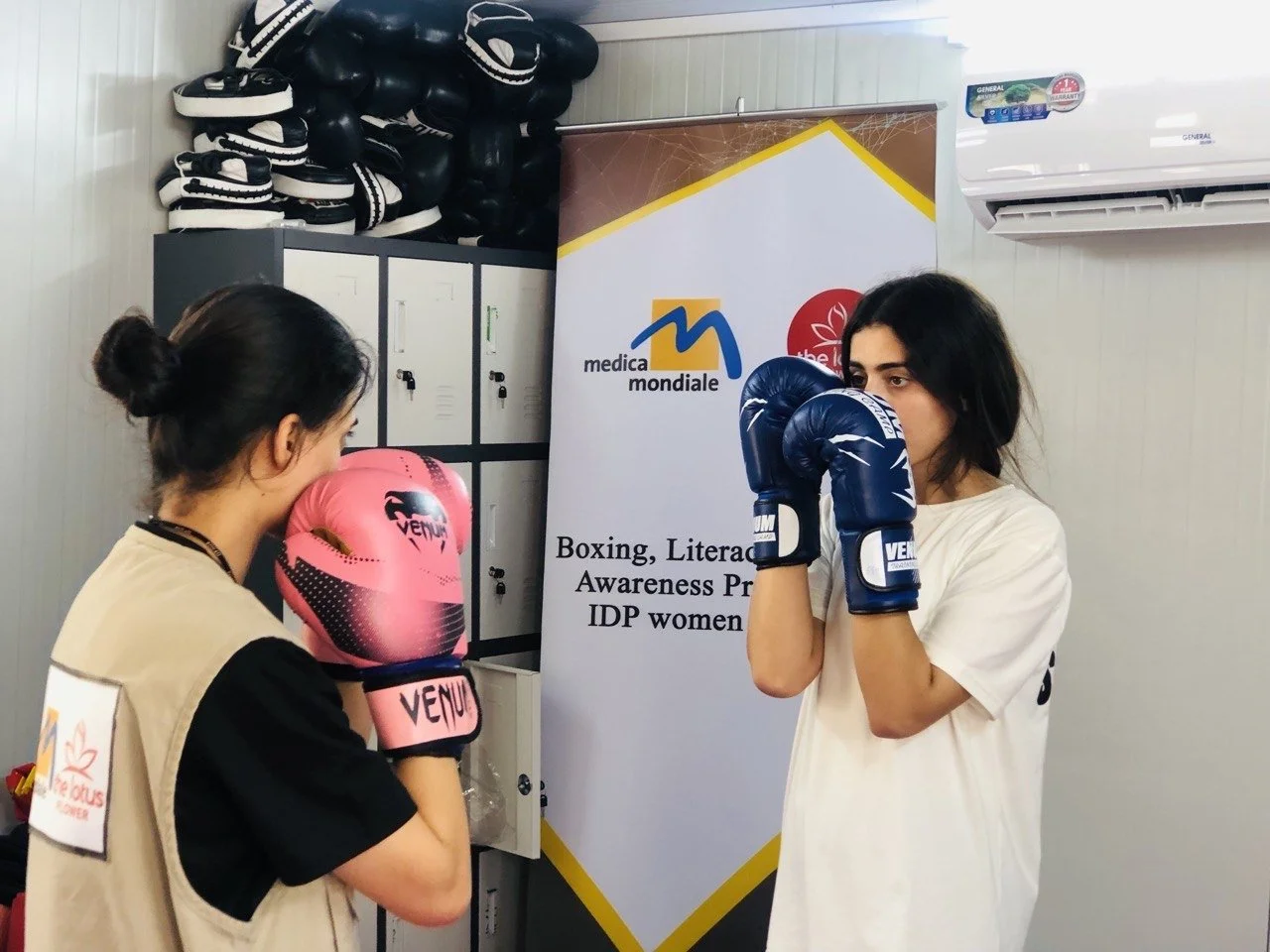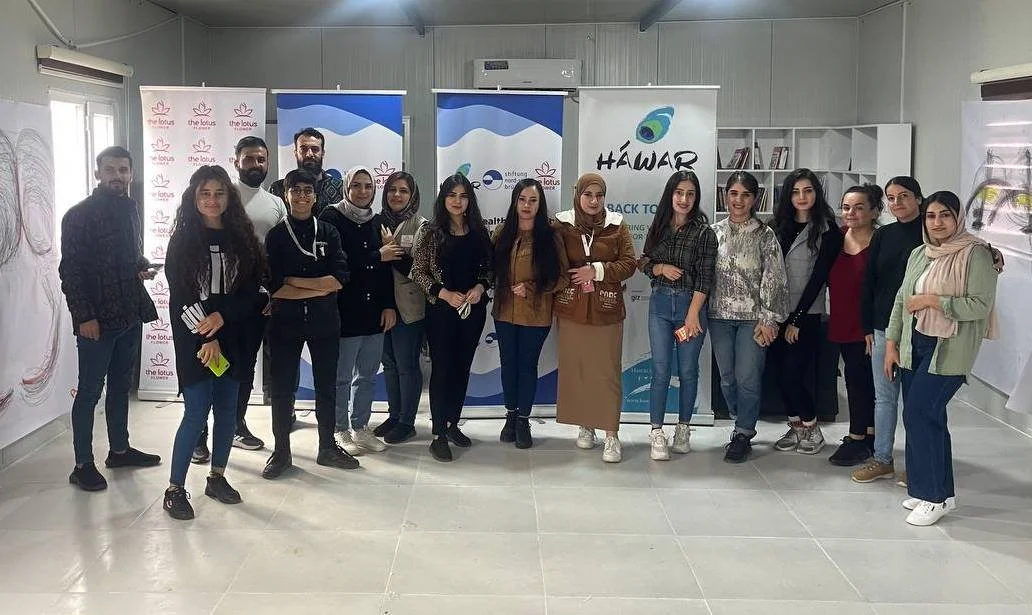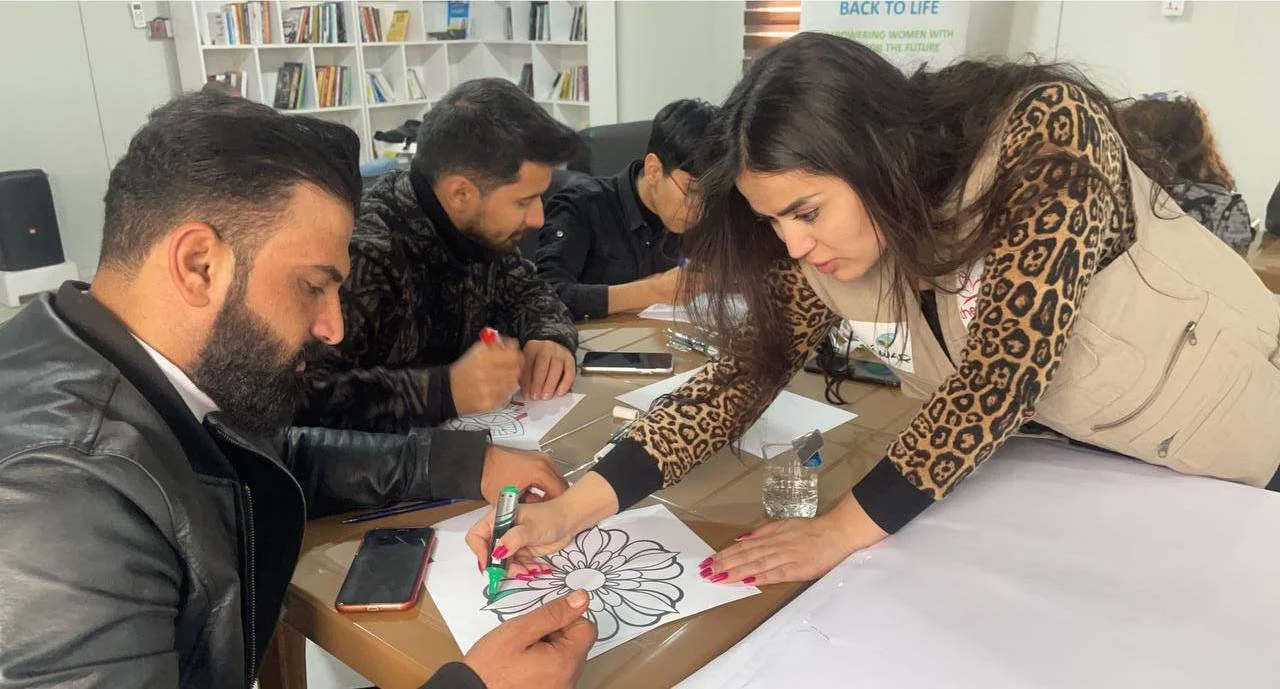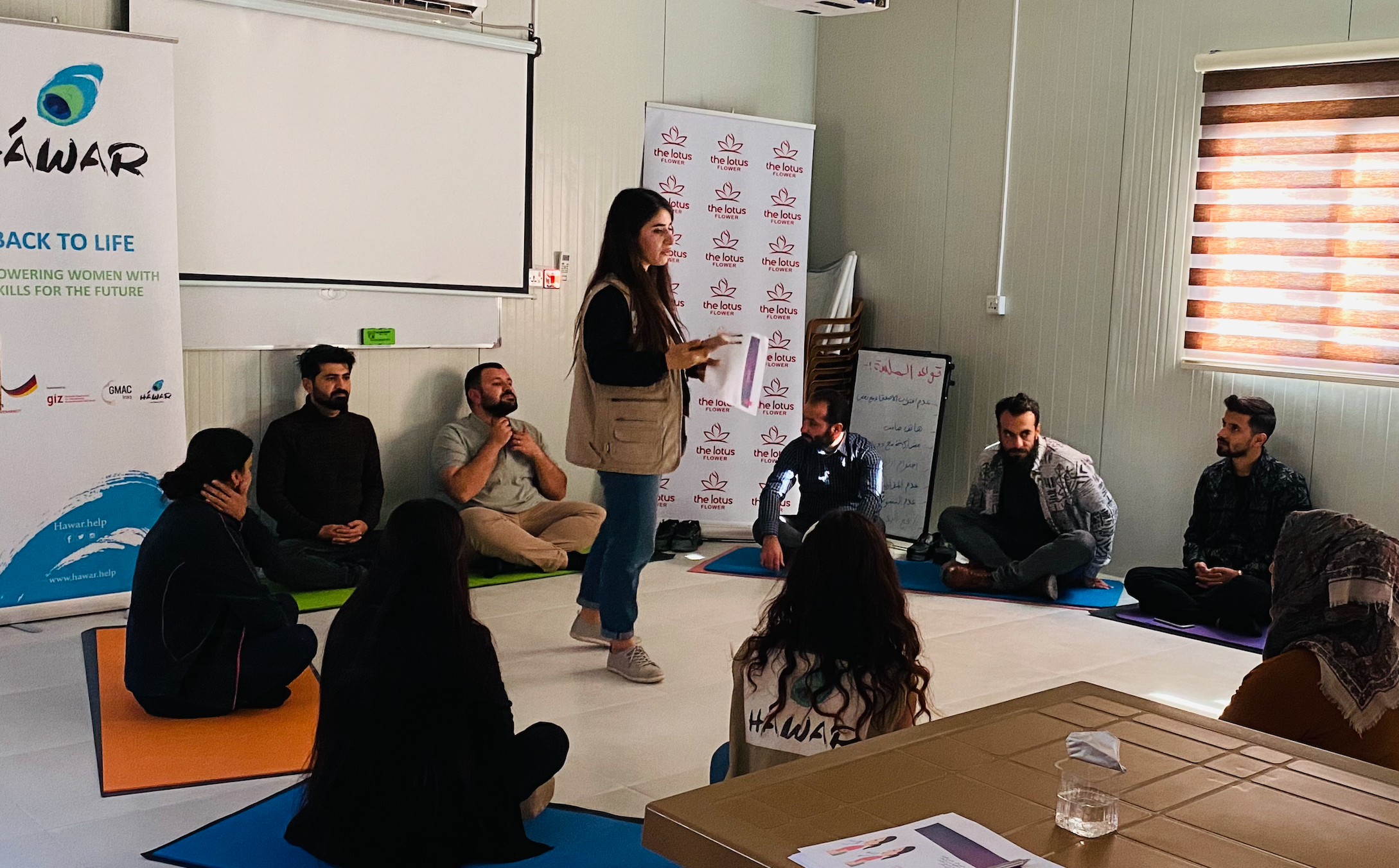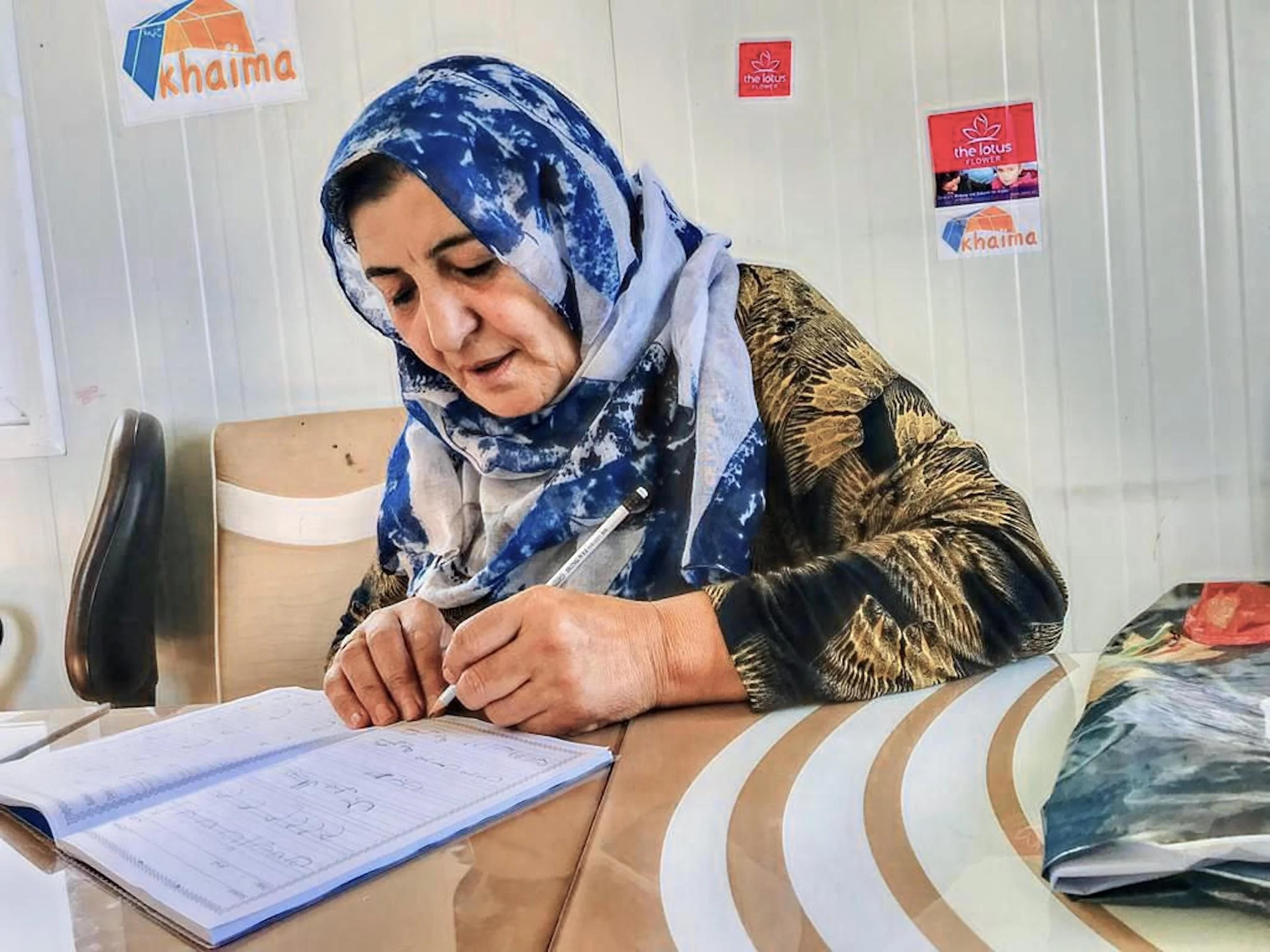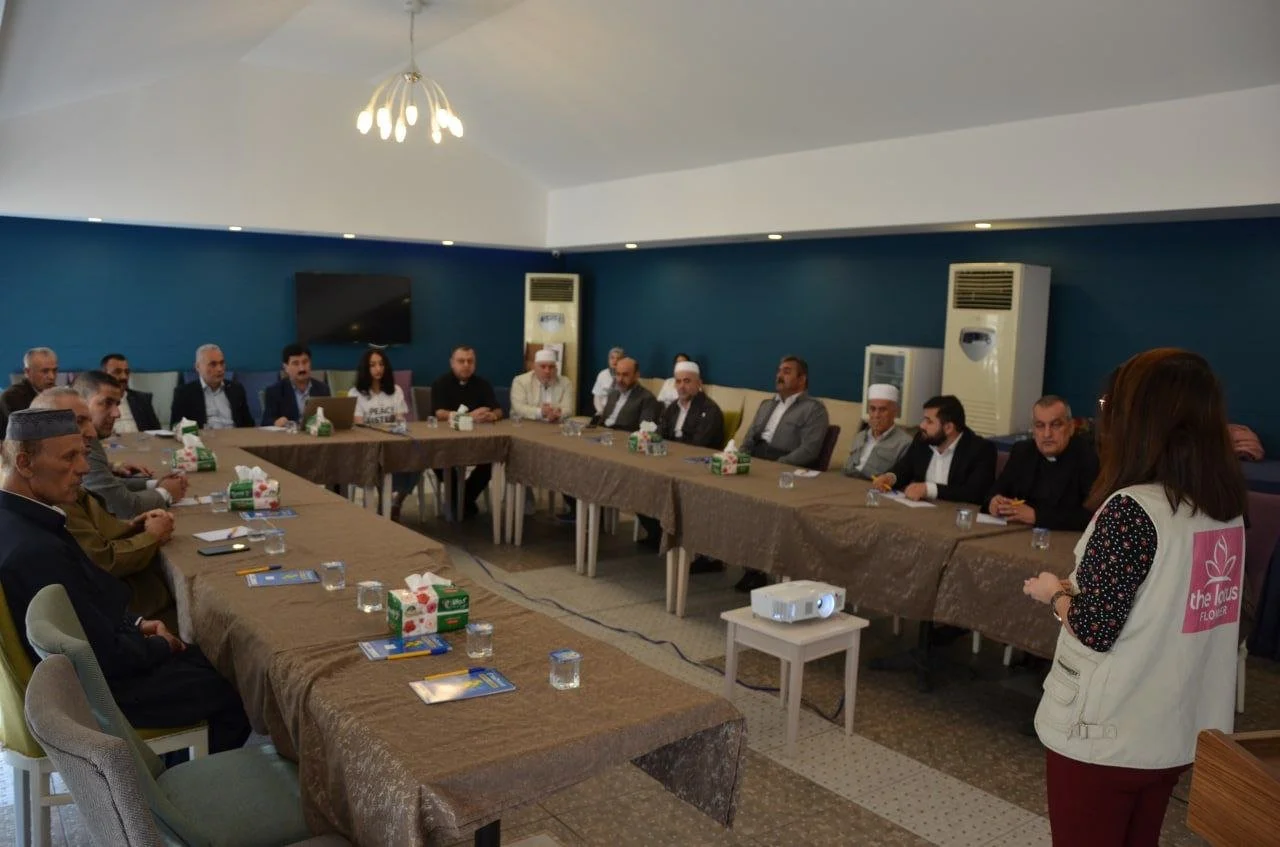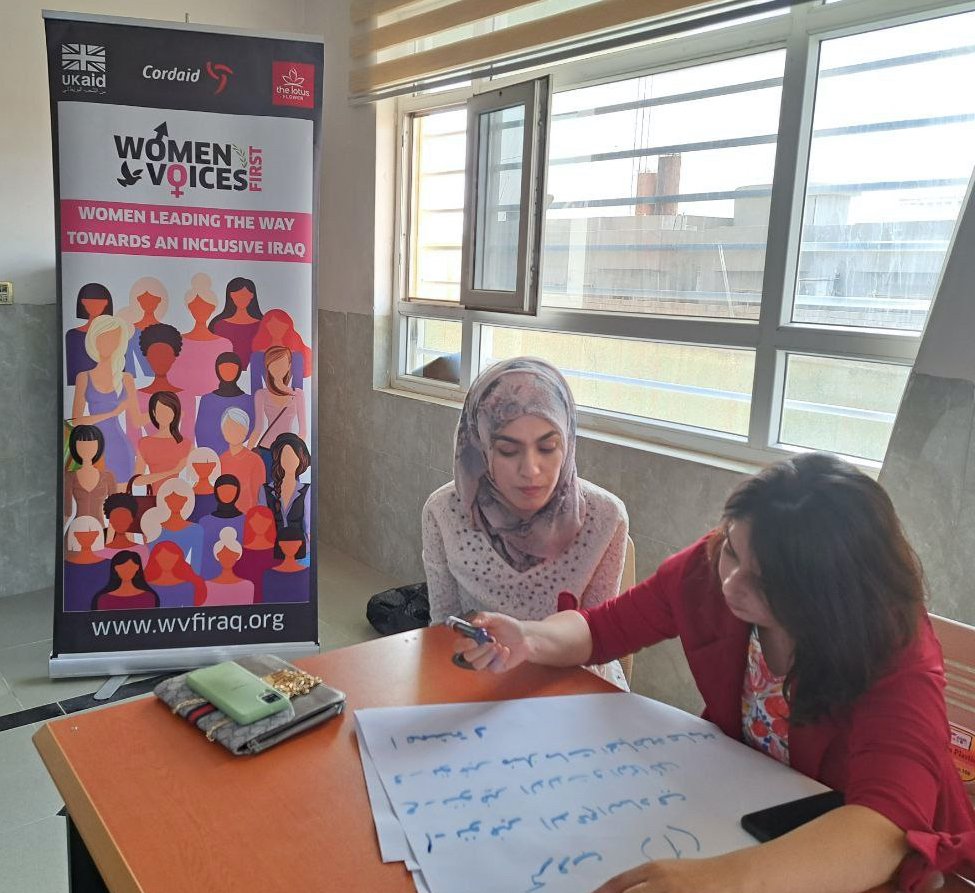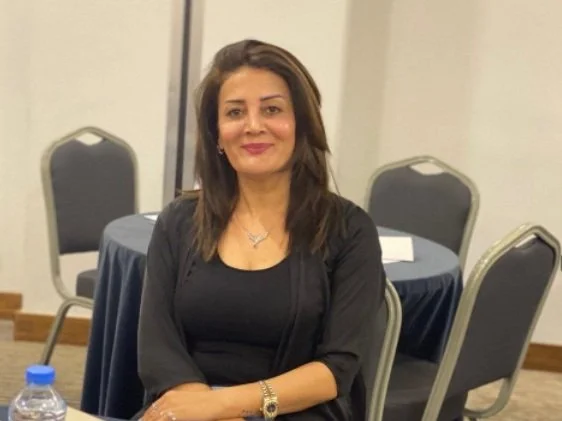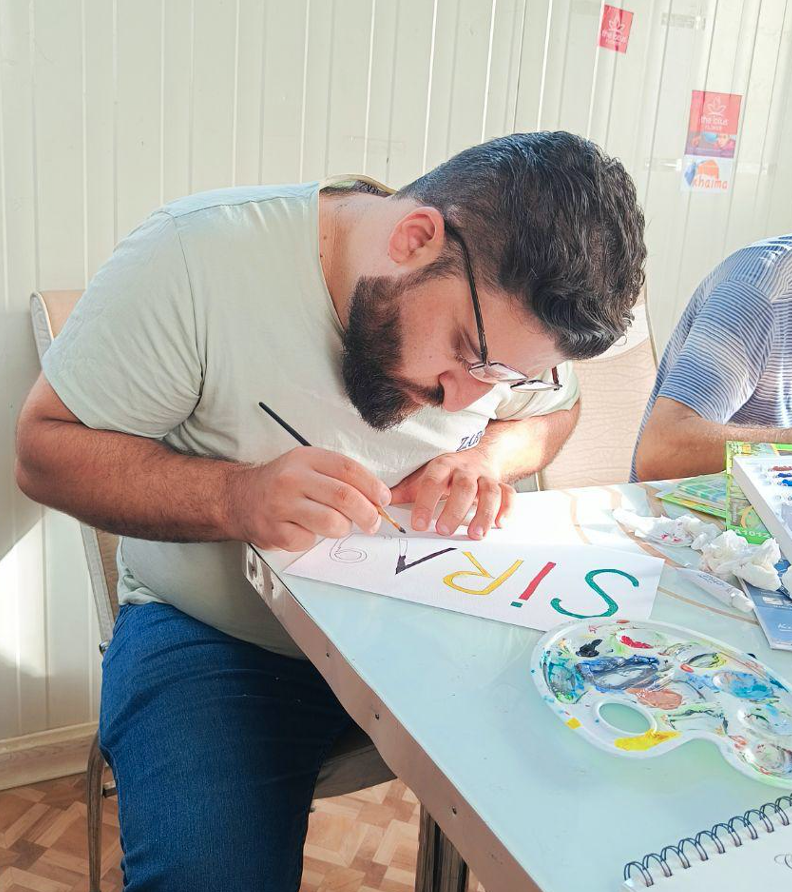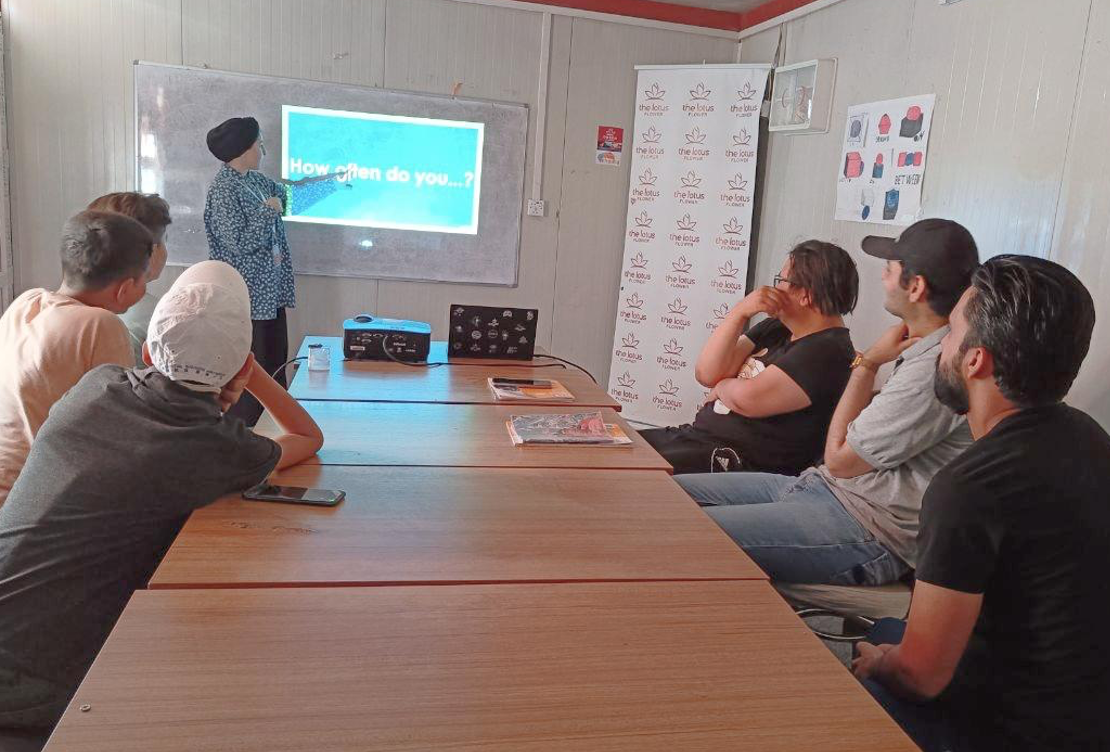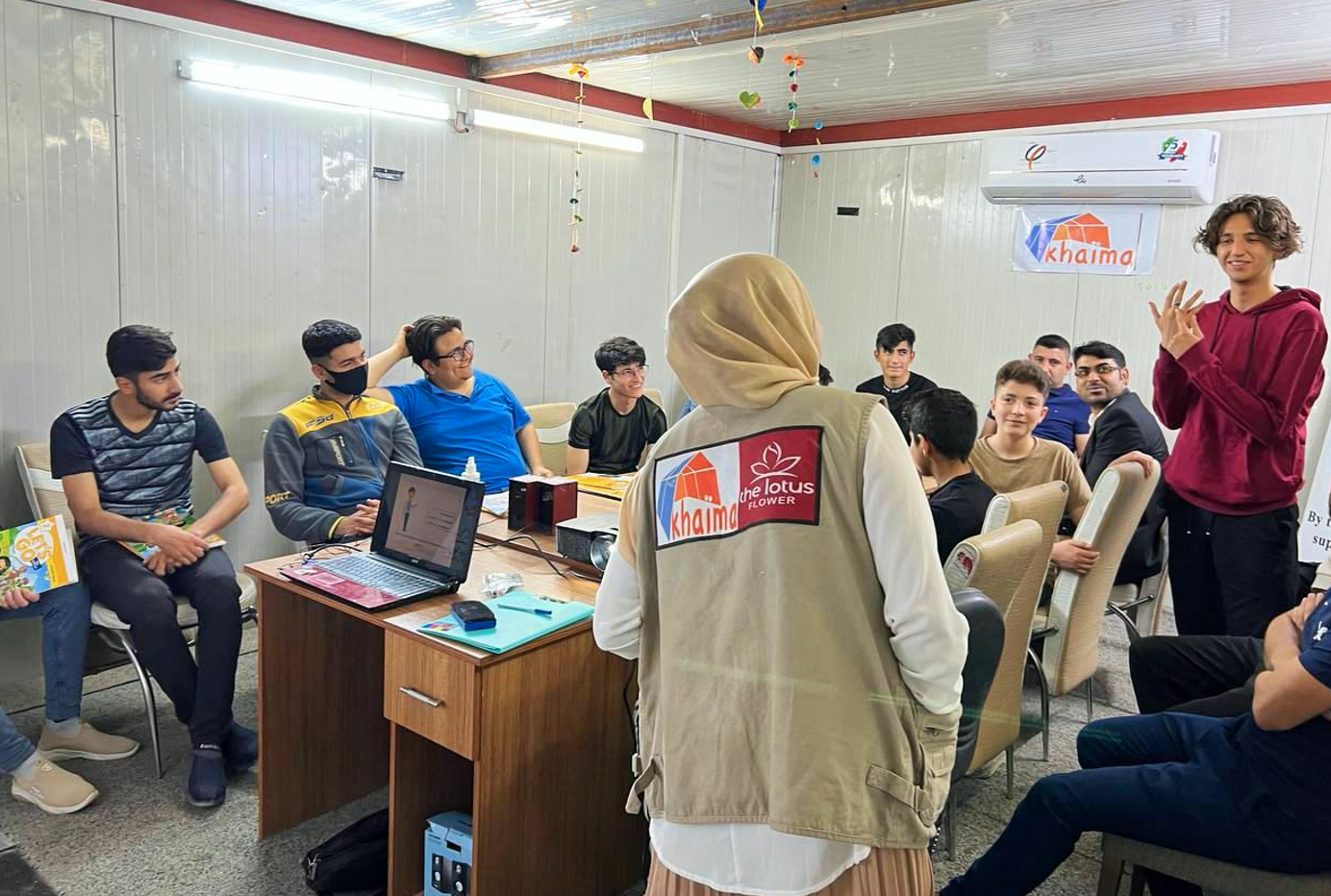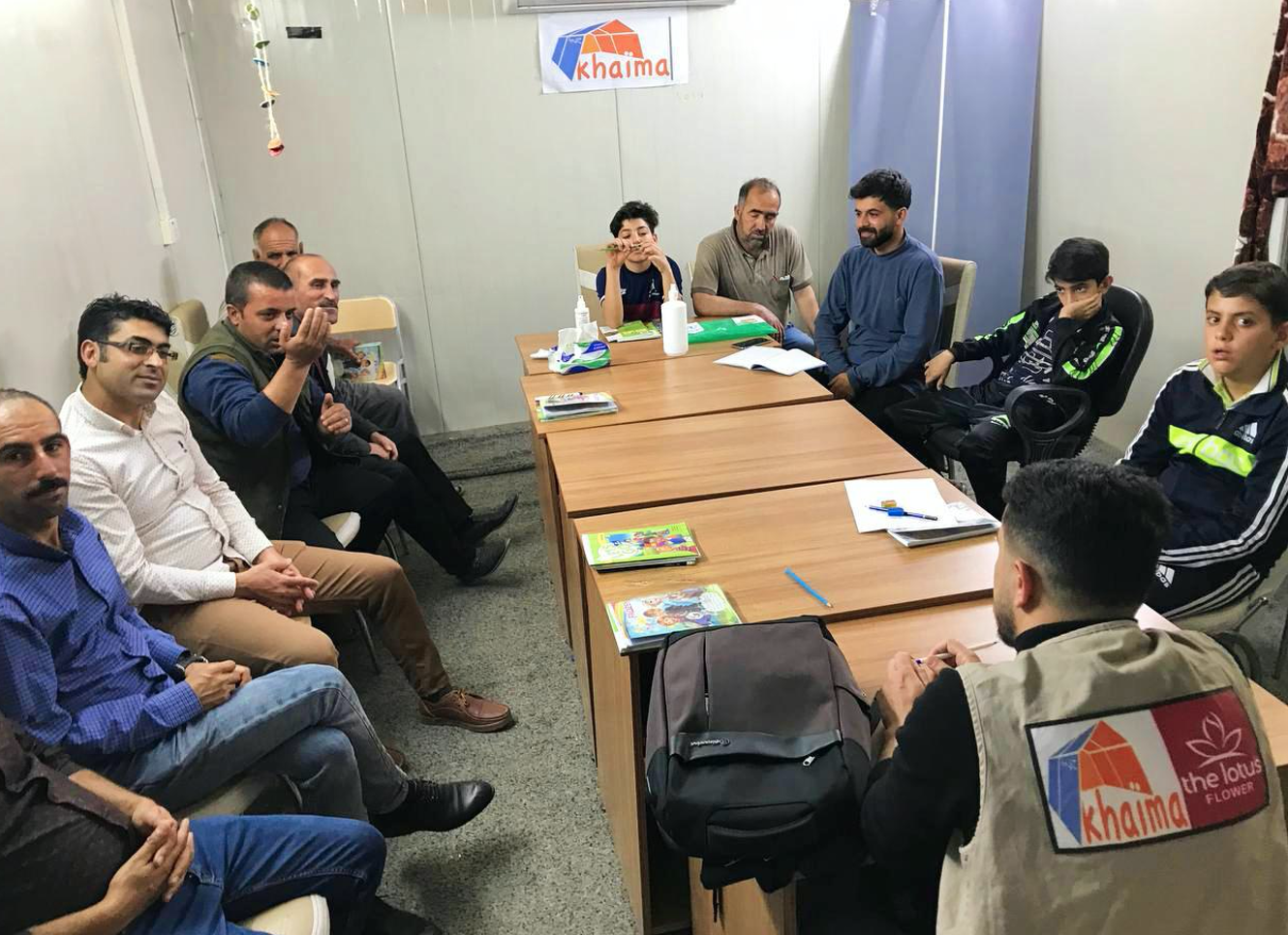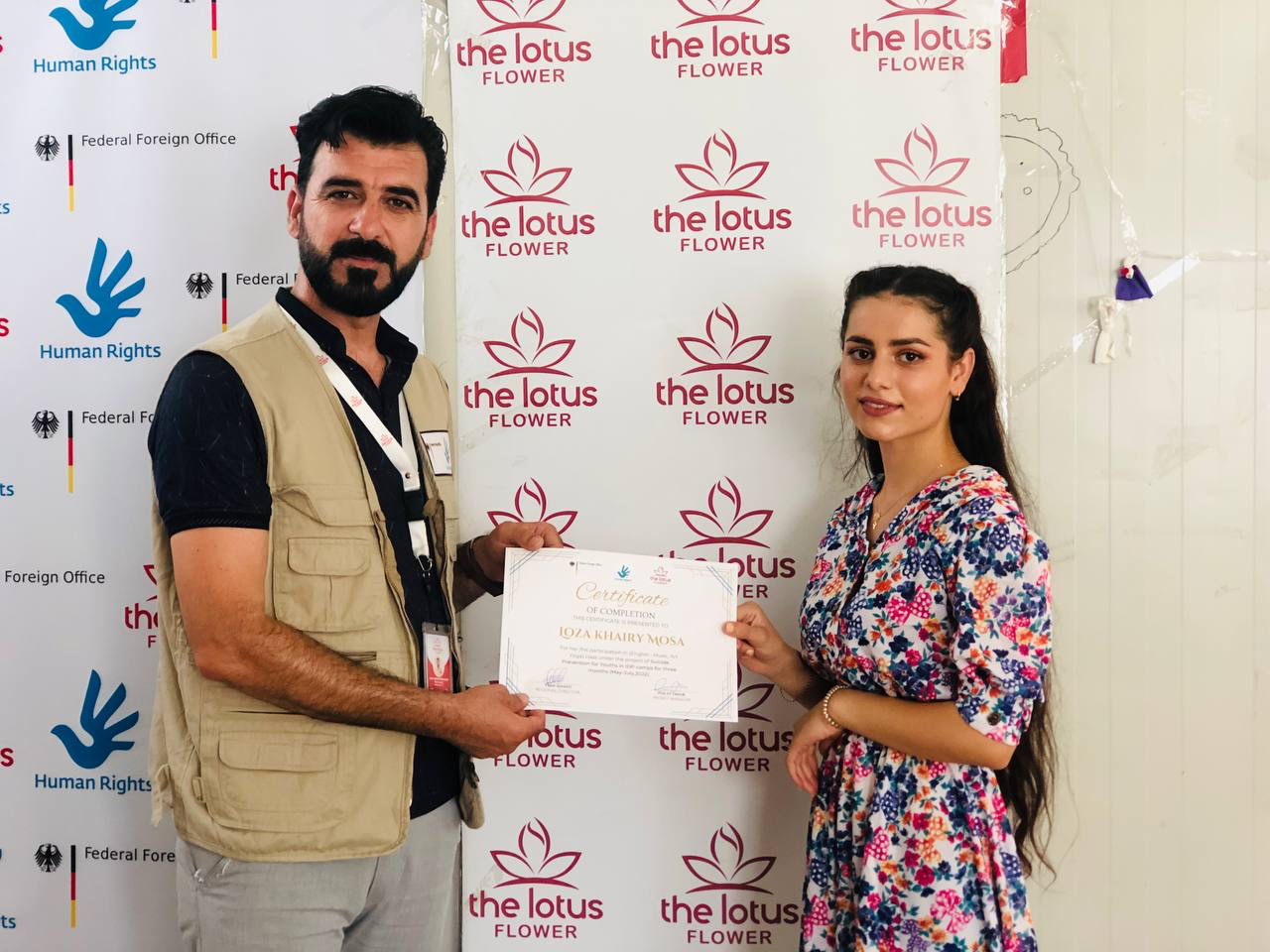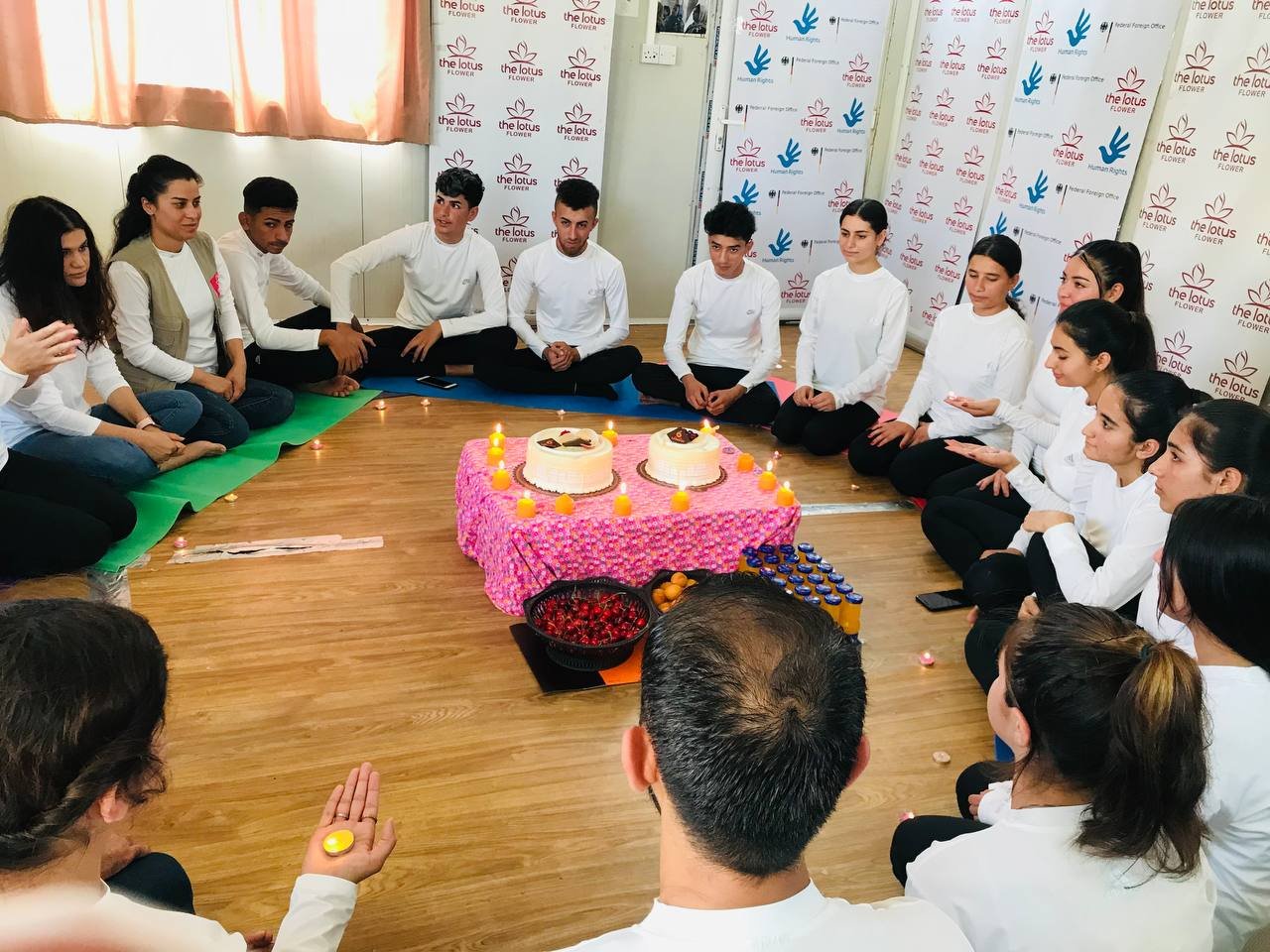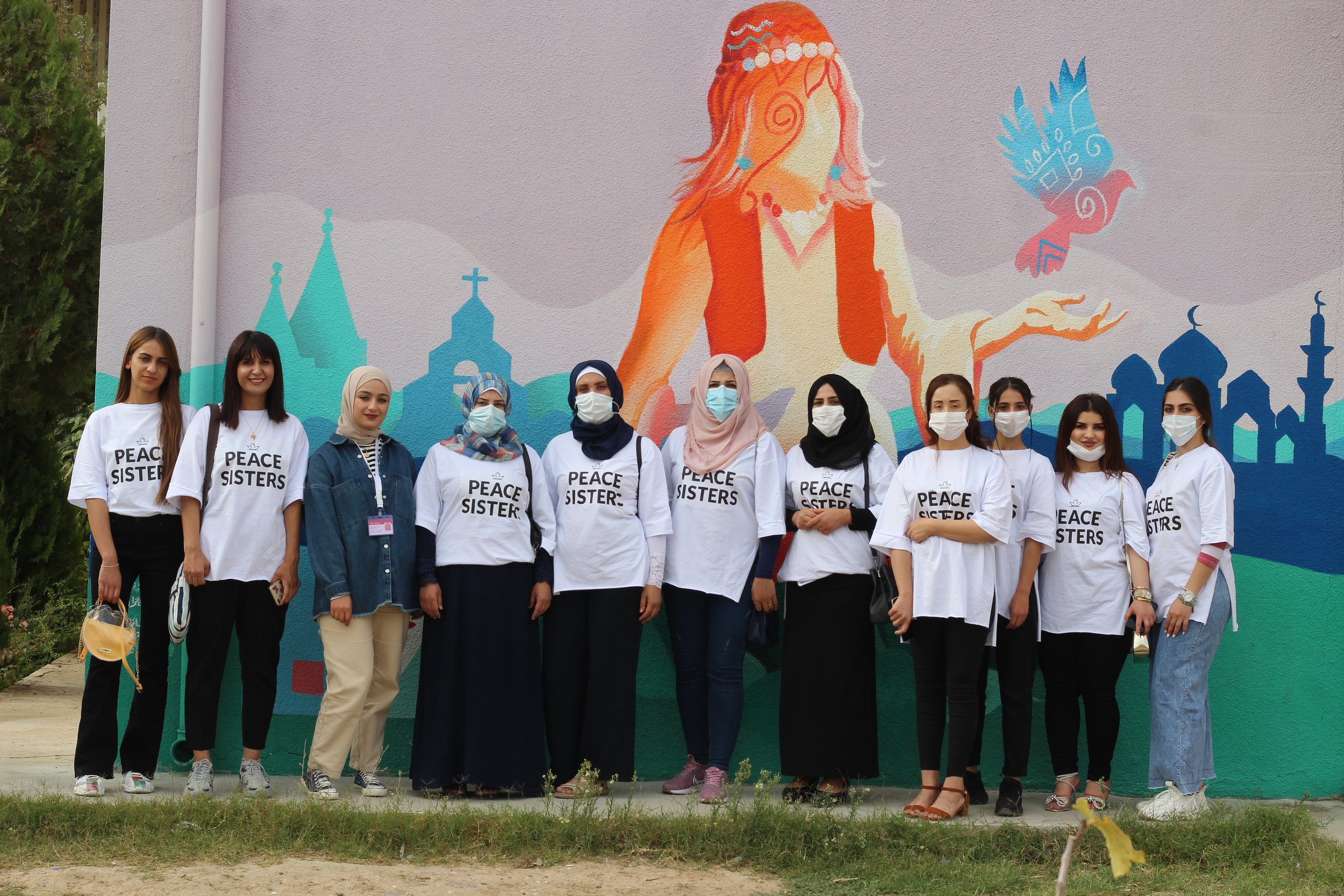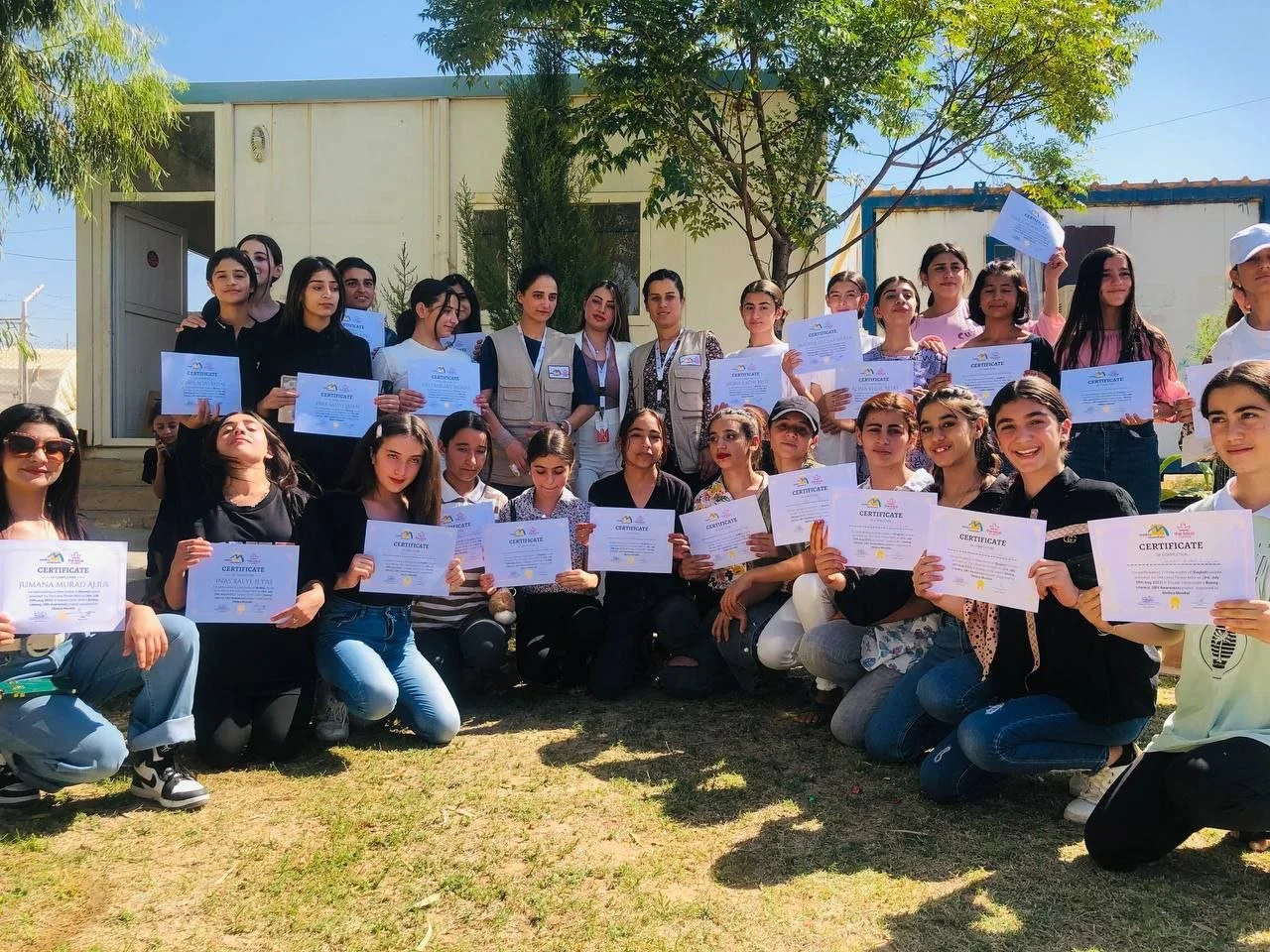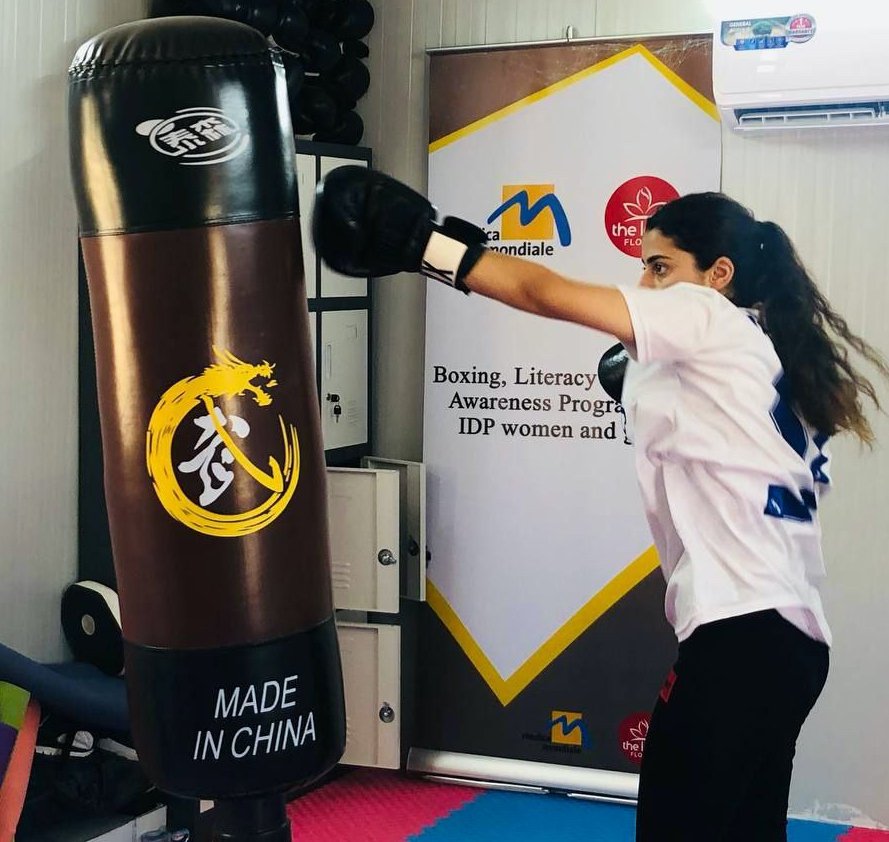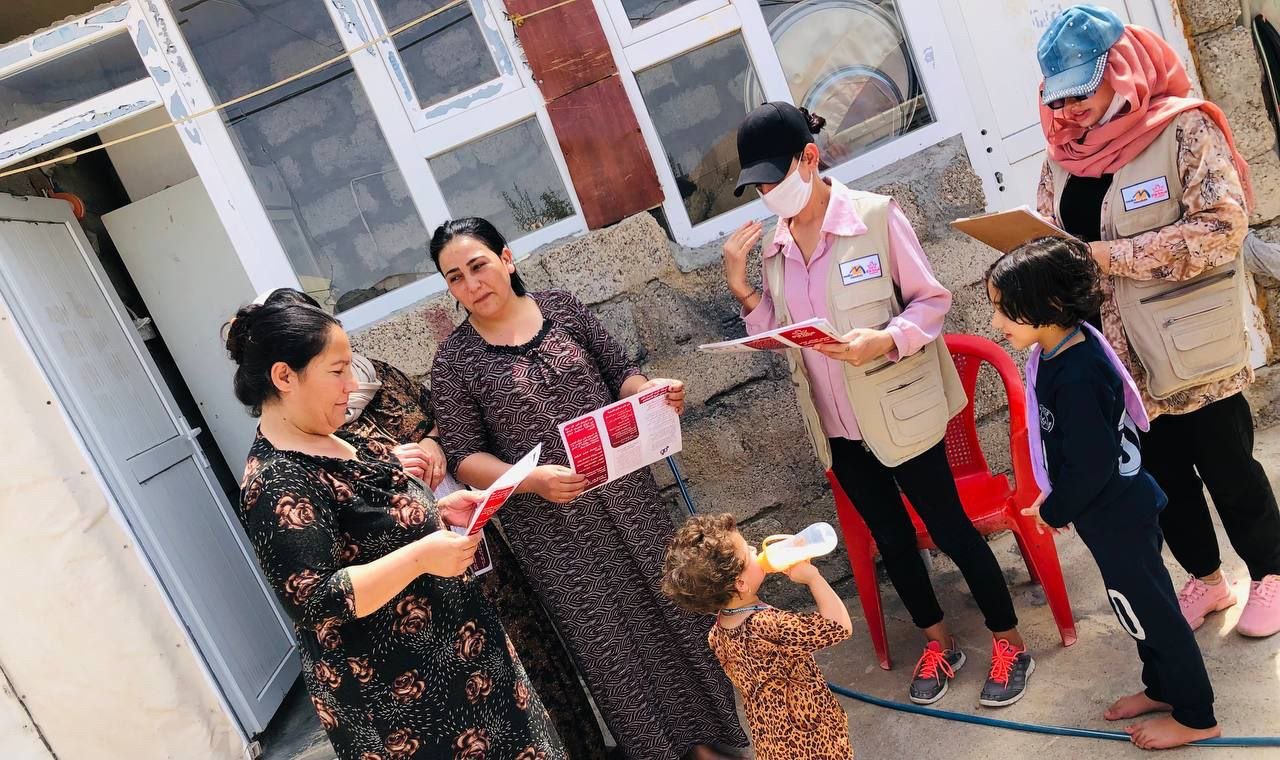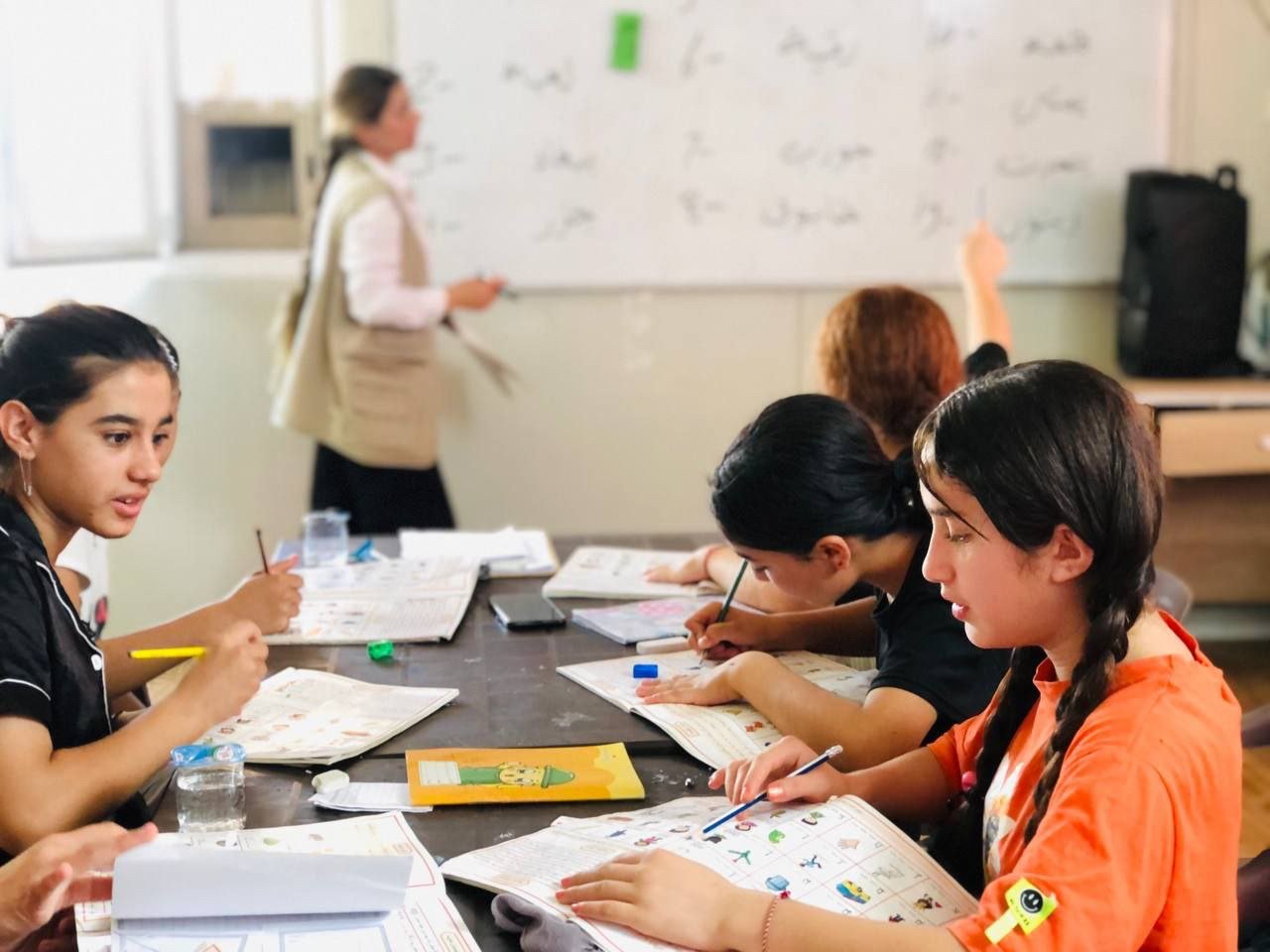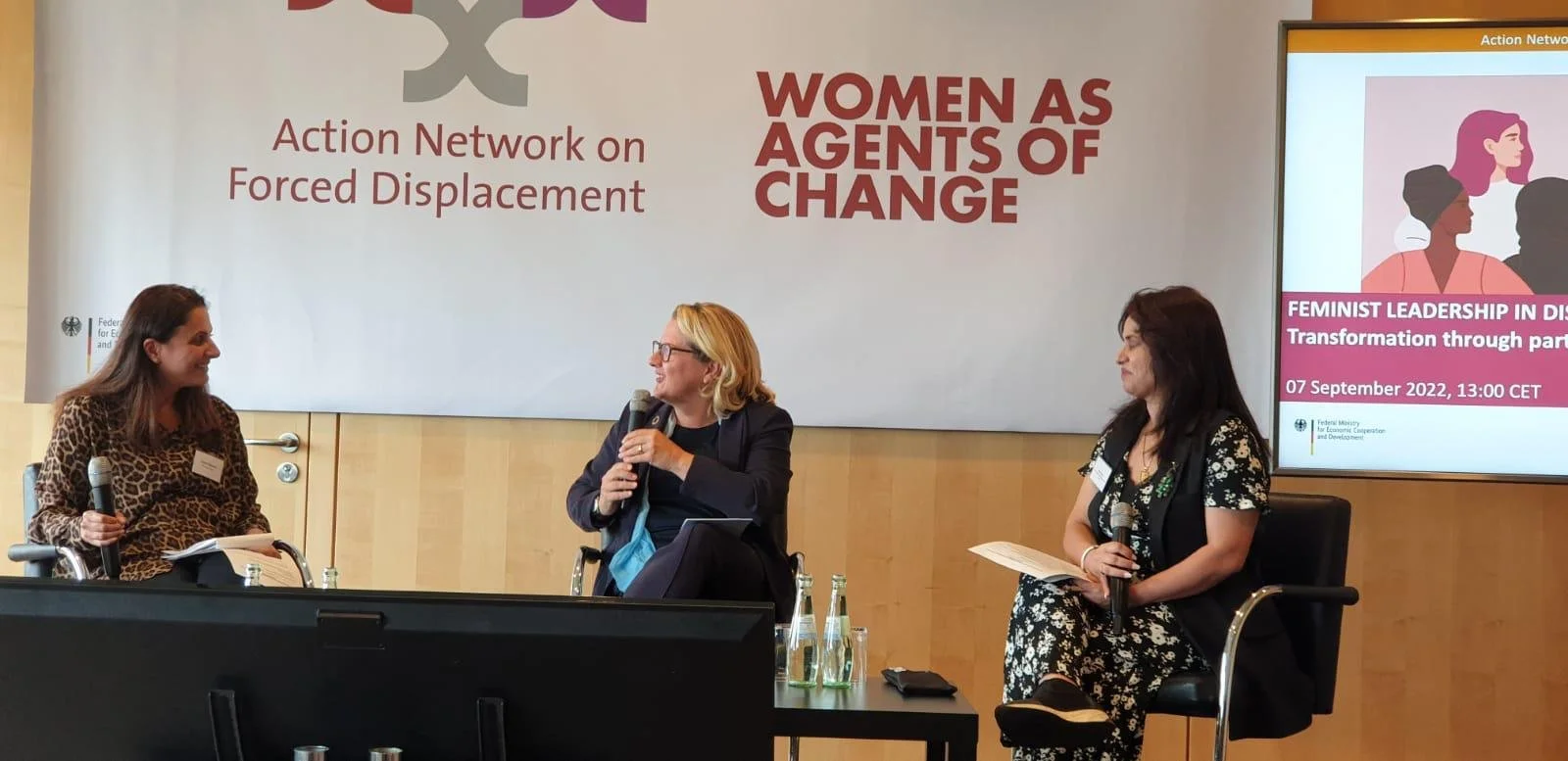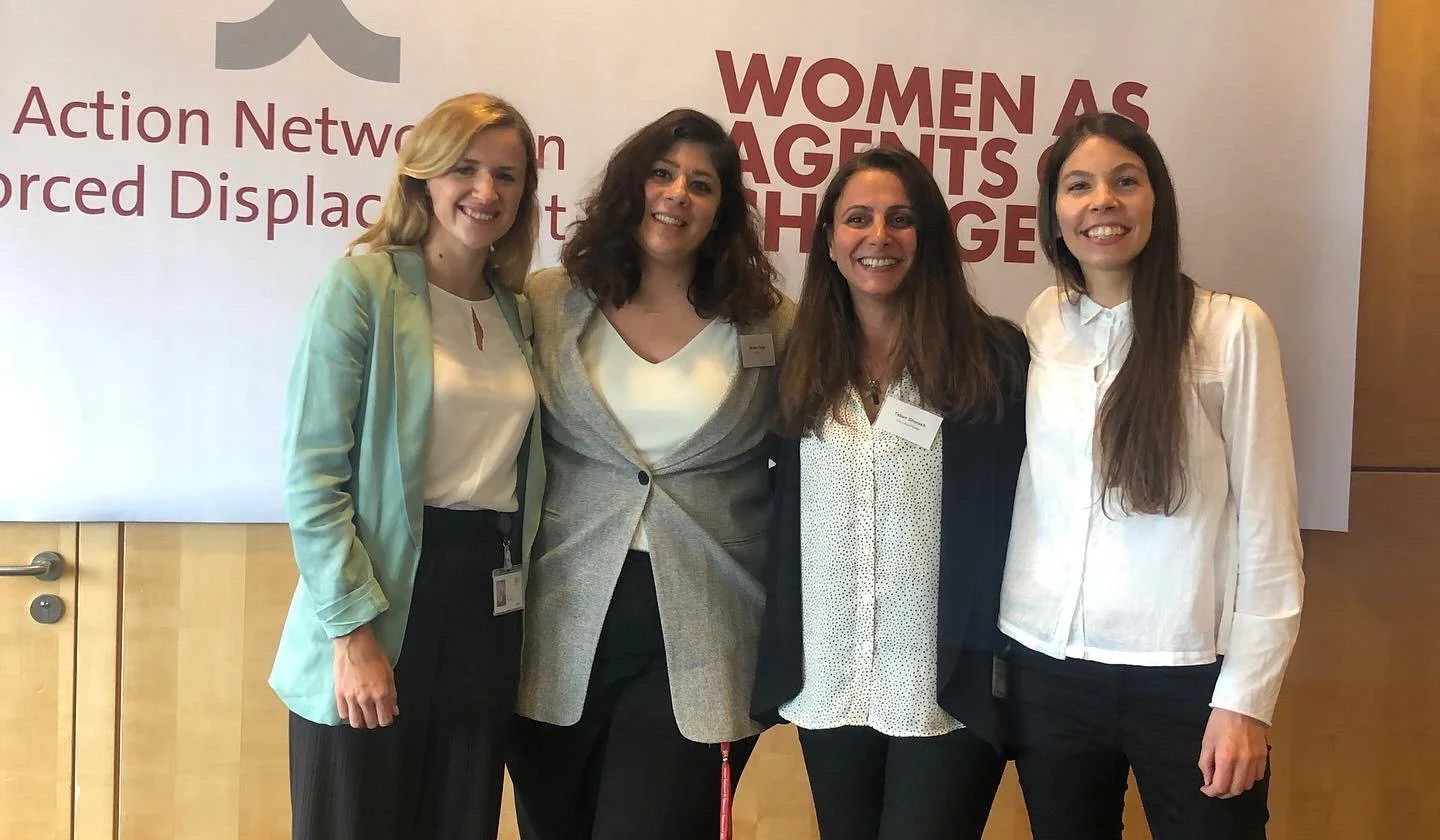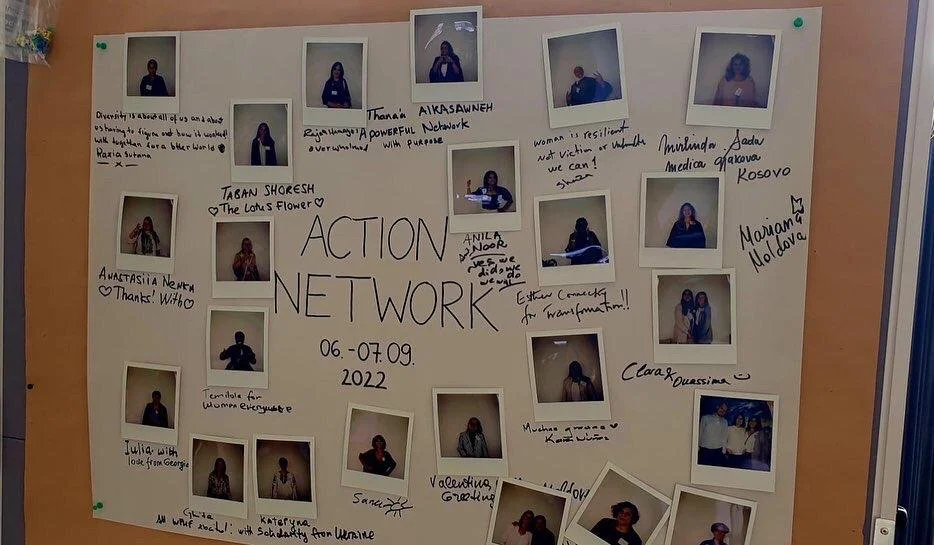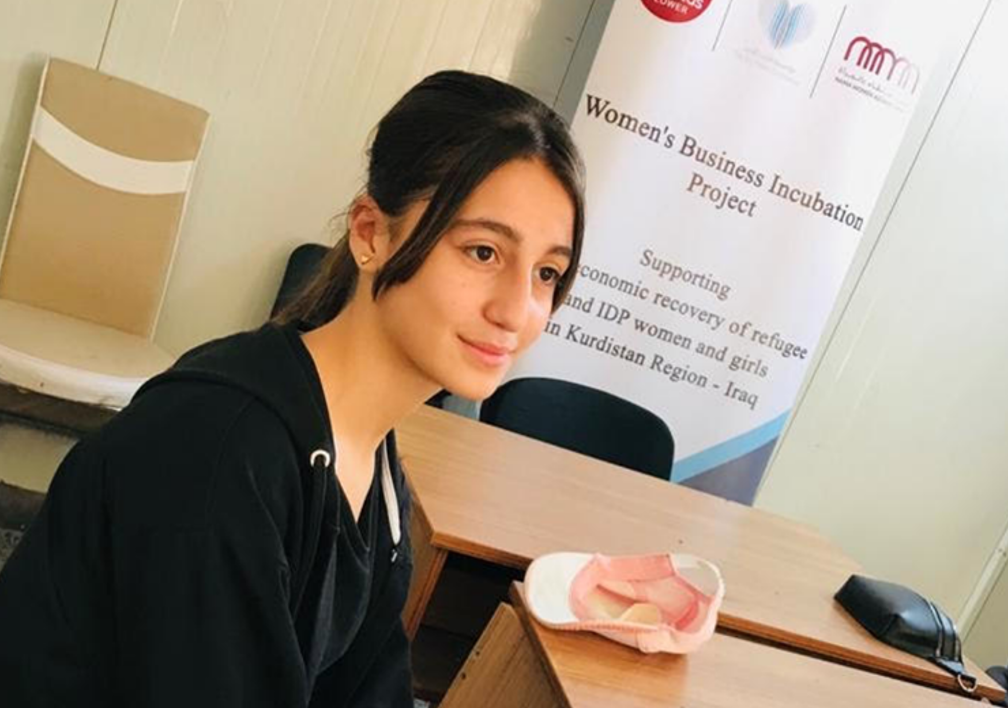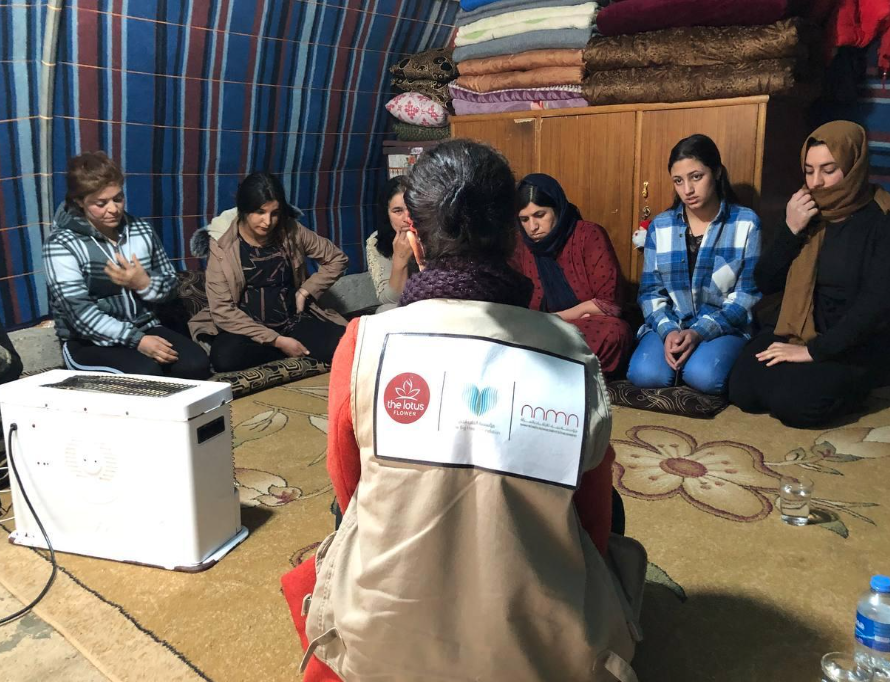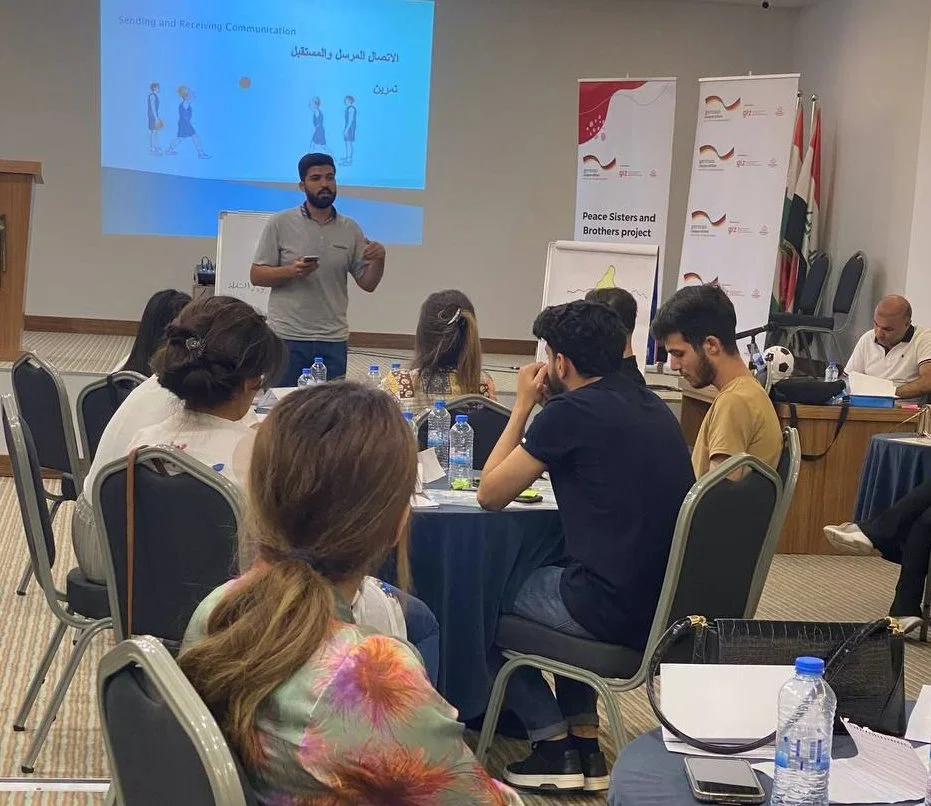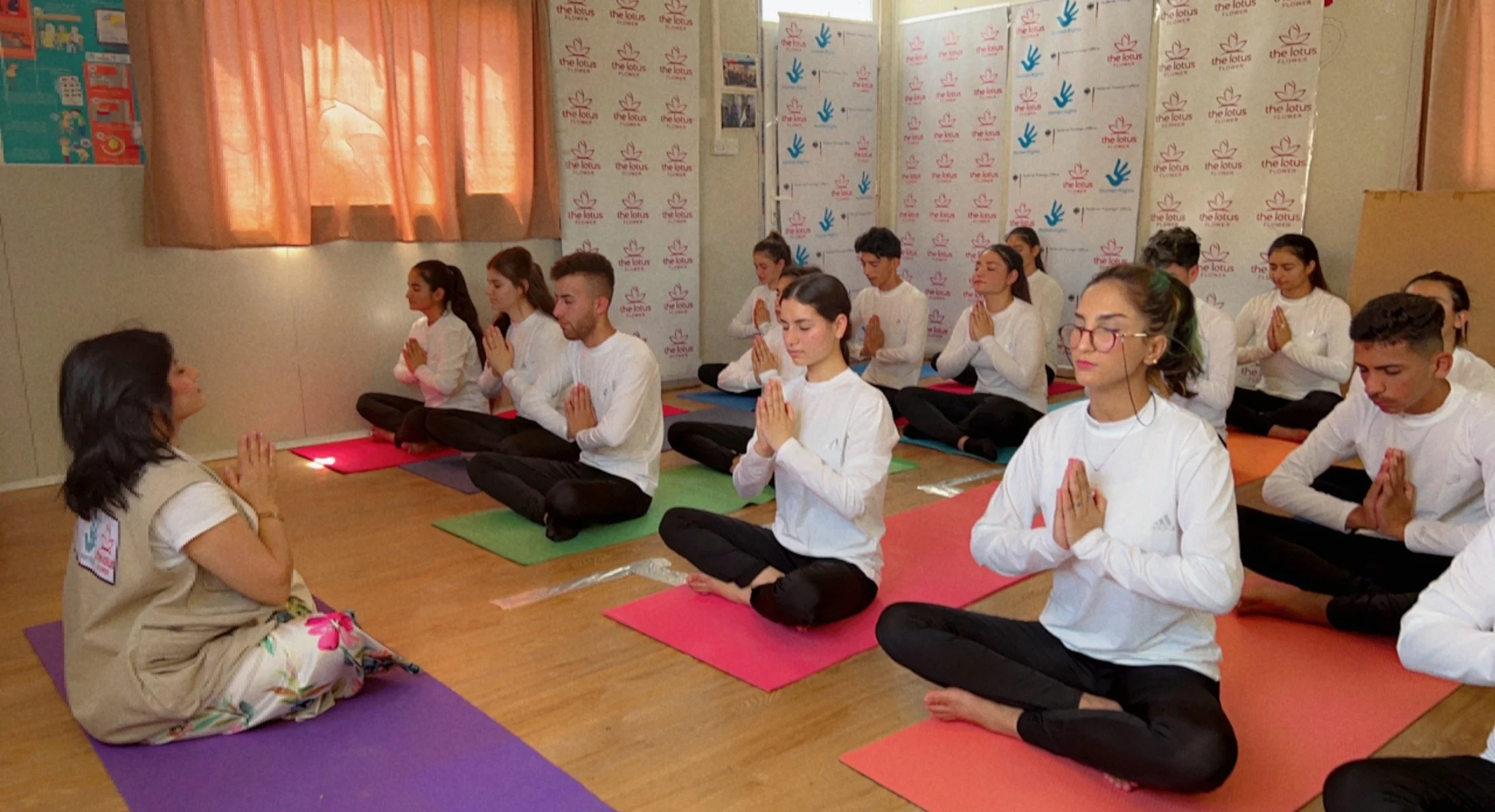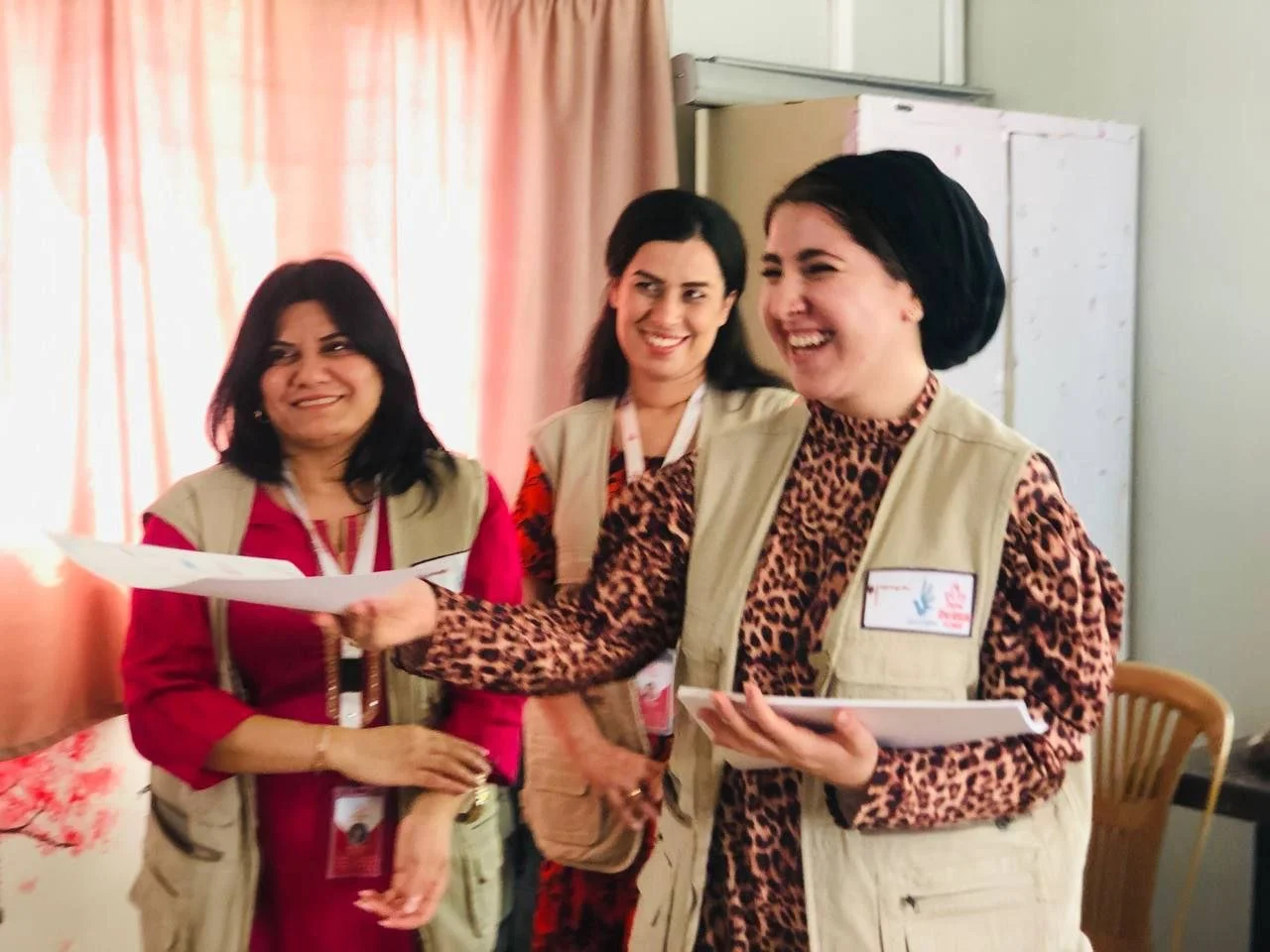Our projects are showcased at #16DAYS UNHCR event
We were thrilled to take part in a big event as part of this year’s #16DaysOfActivism which highlighted the incredible work of local and international NGOs in Kurdistan Region of Iraq.
The conference, called ‘Let’s Talk’, took place in Erbil and aimed to enhance discussion and raise greater awareness about the need to combat gender-based violence in Kurdistan and Iraq.
It brought together many different organisations to mark the international 16 Days campaign which began on 25 November and runs until World Human Rights Day on 10 December.
The Lotus Flower delegation!
As part of the showcase, a number of our Boxing Sisters took to the stage to give a demonstration of their sparring and self-defence skills. As a highly fitting representation of female activism and empowerment, our successful boxing project enables girls to better protect themselves from GBV, and also builds their confidence and ability to recover from past trauma.
Our Boxing Sisters with US Ambassador Alina Romanowski
The Boxing Sisters were pleased to meet Alina Romanowski, Ambassador at Iraq’s US Embassy, who was one of the guests of honour at the event. She also met women’s-business owners who showed her their work, as well as sampling some of the cakes and pastries made by our Baking Sisters. Artworks and photography created by women we support were proudly displayed too.
In addition, a group from our recent Youth Suicide Prevention project were invited to perform traditional songs and music which they had learned especially for the day.
There were also interesting panels on topics around GBV prevention and elimination, with our Regional Director Vian Ahmed taking part in an informative debate on the need for greater community engagement. The panel focused on the importance of male participation and mobilisation in order to reduce GBV, and Vian spoke about external factors which have increased gender discrimination and violence, such as the effects of the pandemic, work pressures and alcohol and drug abuse.
Our Regional Director Vian (centre) in one of the panels
Vian also highlighted our Positive Masculinity program as one way of tackling damaging stereotypes and negative behaviours, which in turn can lessen gender inequality and reduce cases of GBV.
Other panel speakers included US Ambassador Alina Romanowski, Kwestan Mohammed Abdulla, Minister of Labour and Social Affairs, and activist Hanaa Edwar, co-founder of the Iraqi Women’s Network. In this panel, which outlined a commitment to ending gender-based violence, SEED Foundation President and moderator Sherri Kraham Talabani stated that GBV cases rose in Iraq by 237% in the first quarter of this year. She added that almost half of all women in the country face violence in their homes. Meanwhile, she told how honour killings in Kurdistan have worryingly doubled this year.
Speaking on this panel, Ms Romanowski told the audience that tackling GBV “needs to remain a priority” in both Kurdistan and Iraq, saying: “We’ve made progress but we’re not done, this is a generational challenge for us.”
It was a great honour to be involved in this prestigious event, and you can see more photos below…
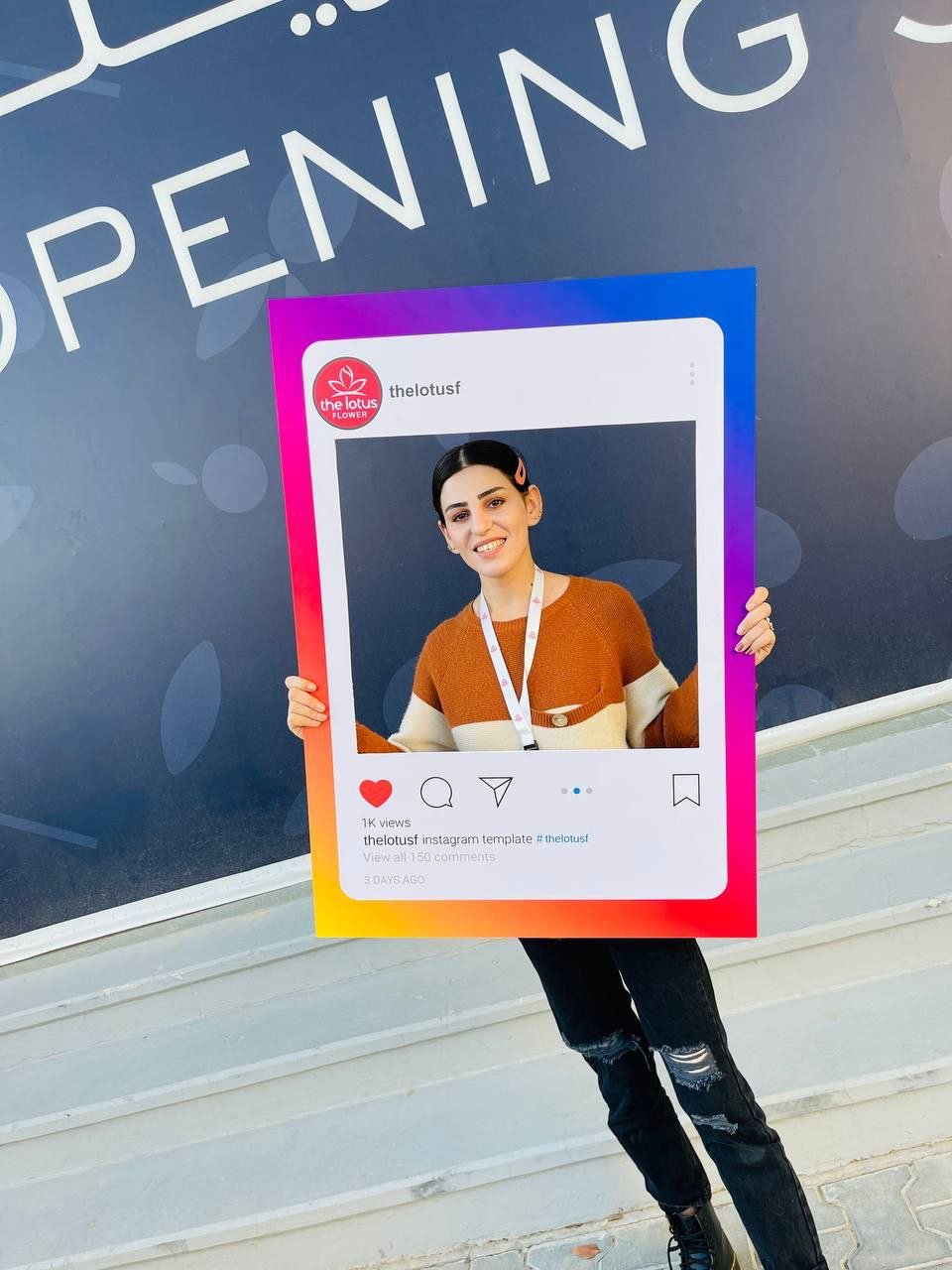
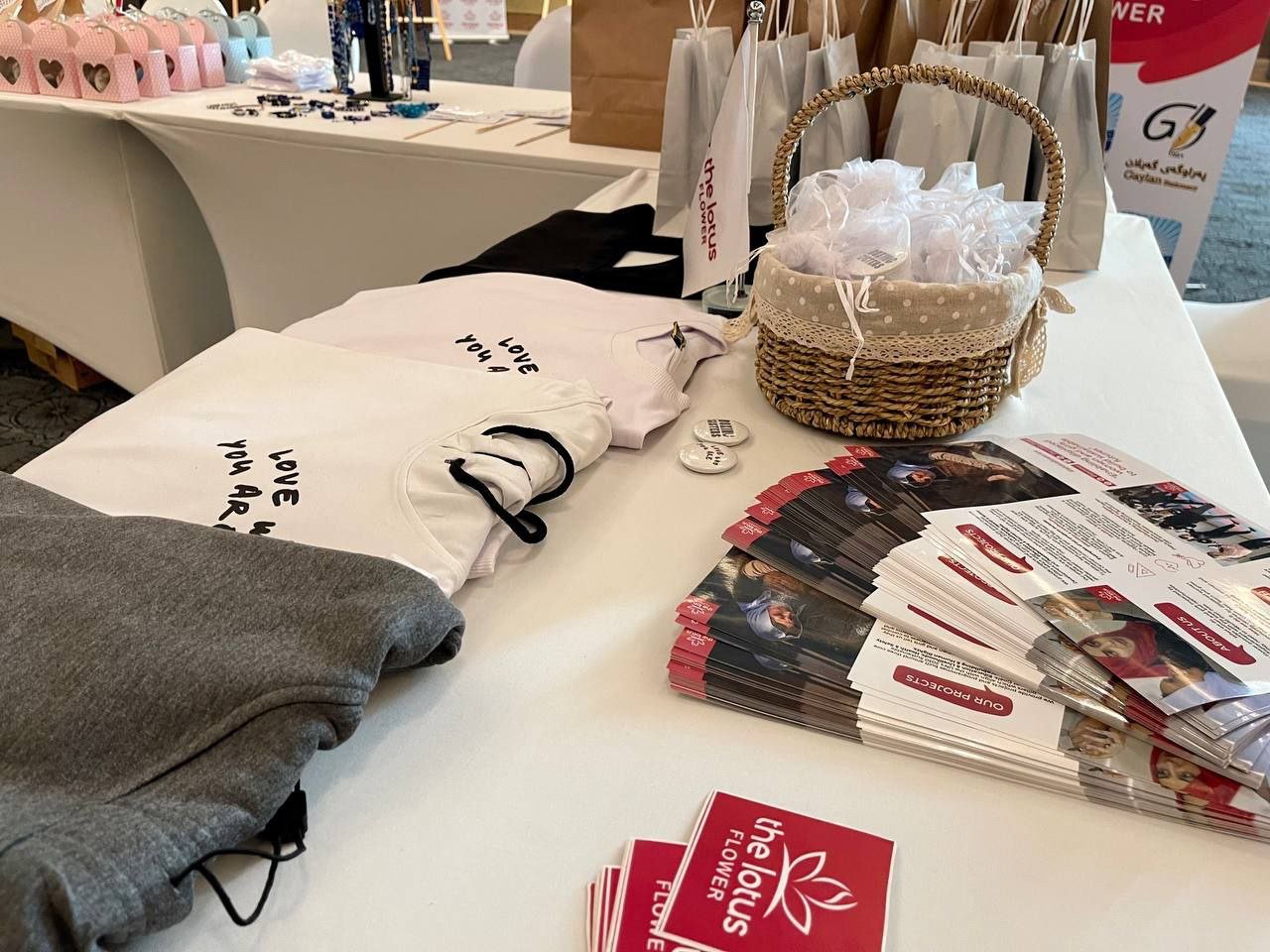
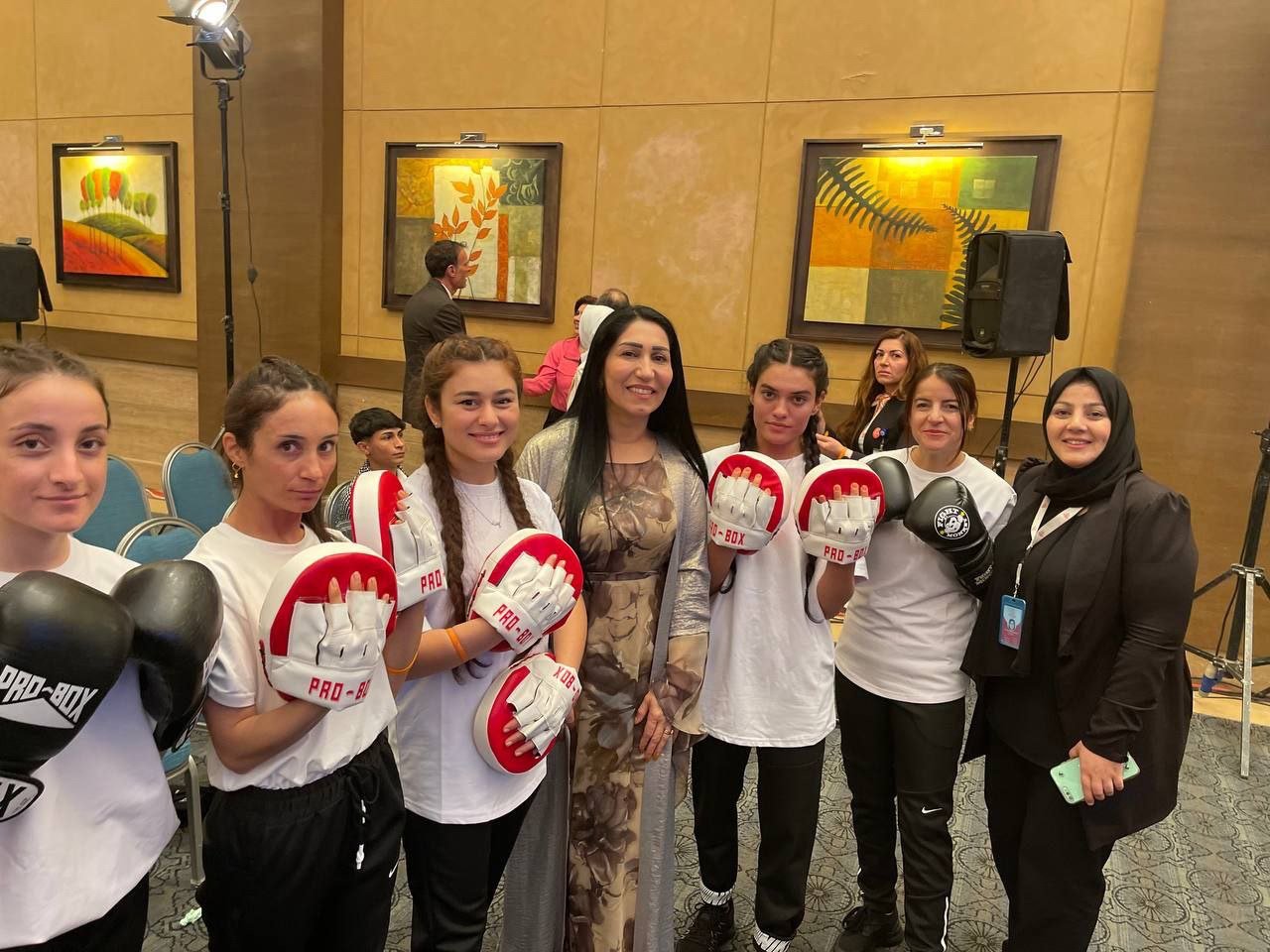
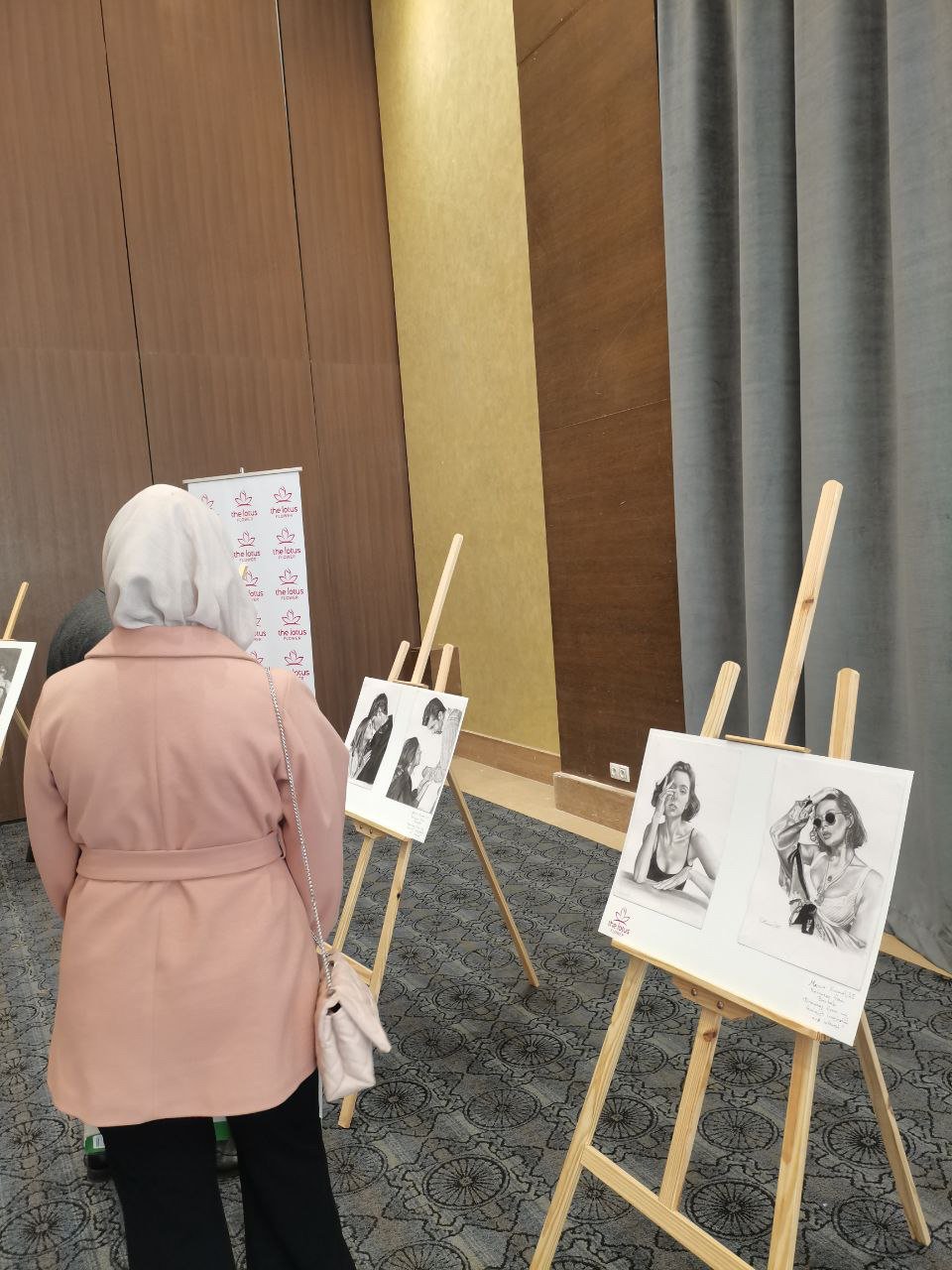

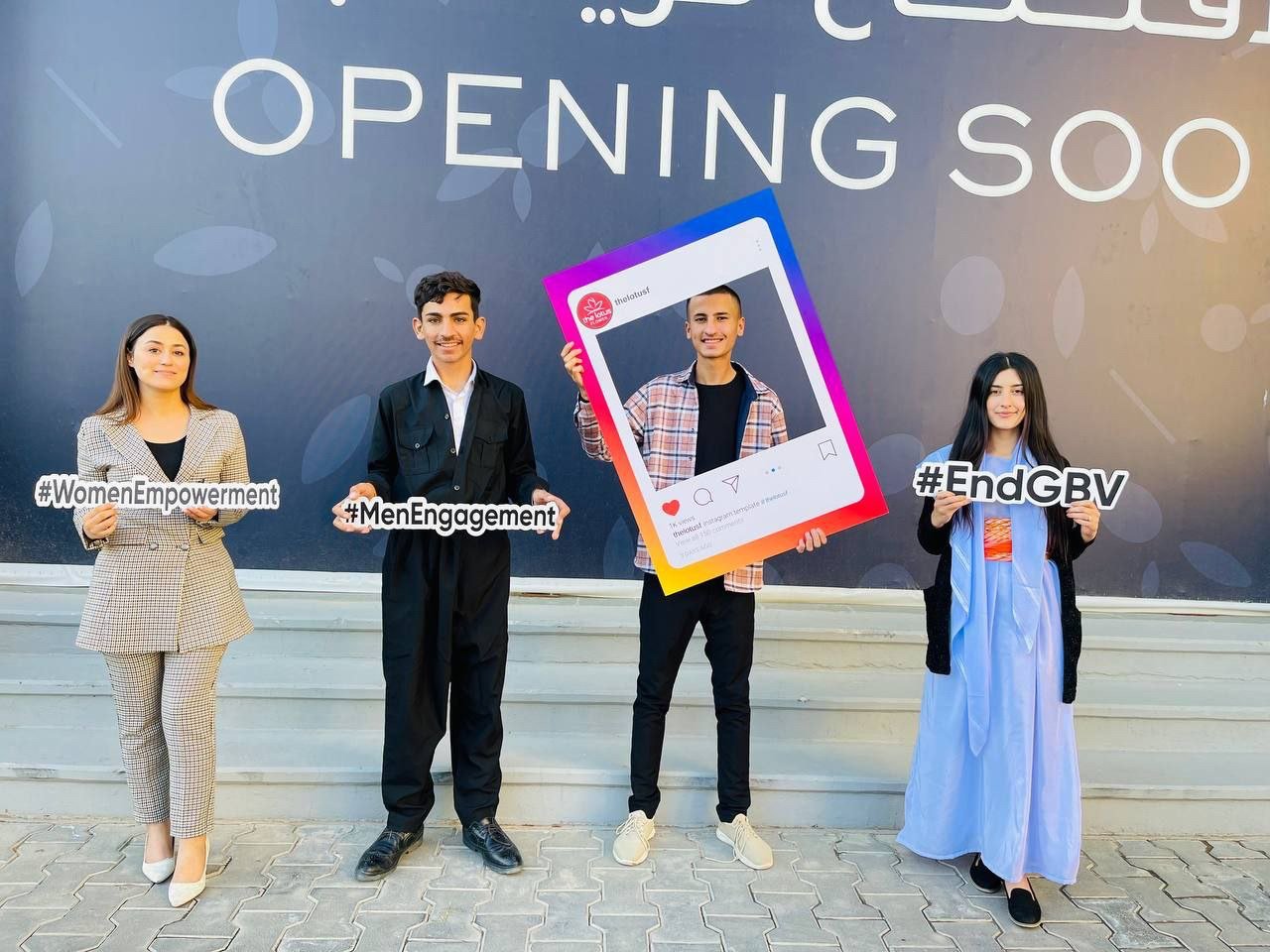
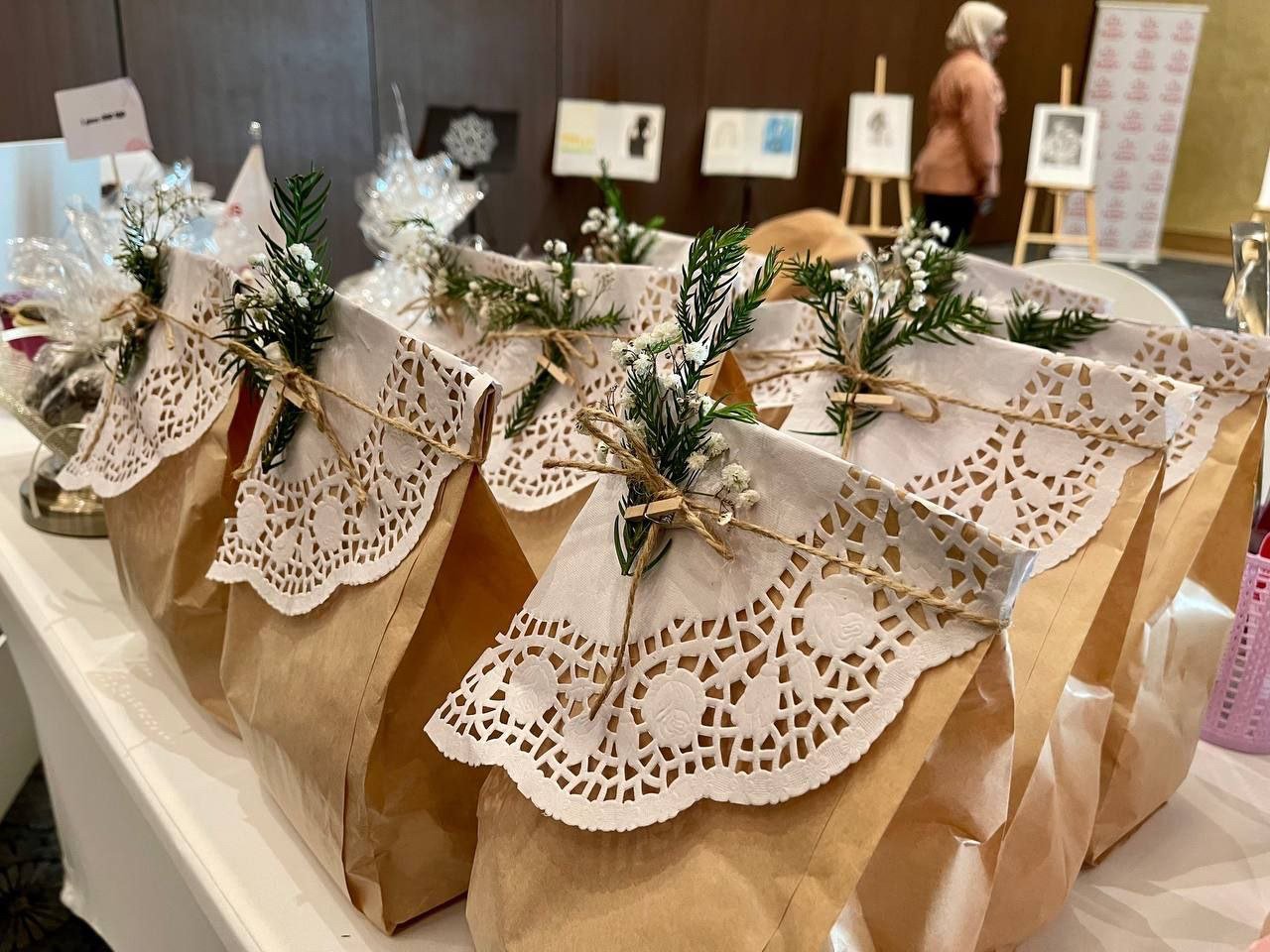
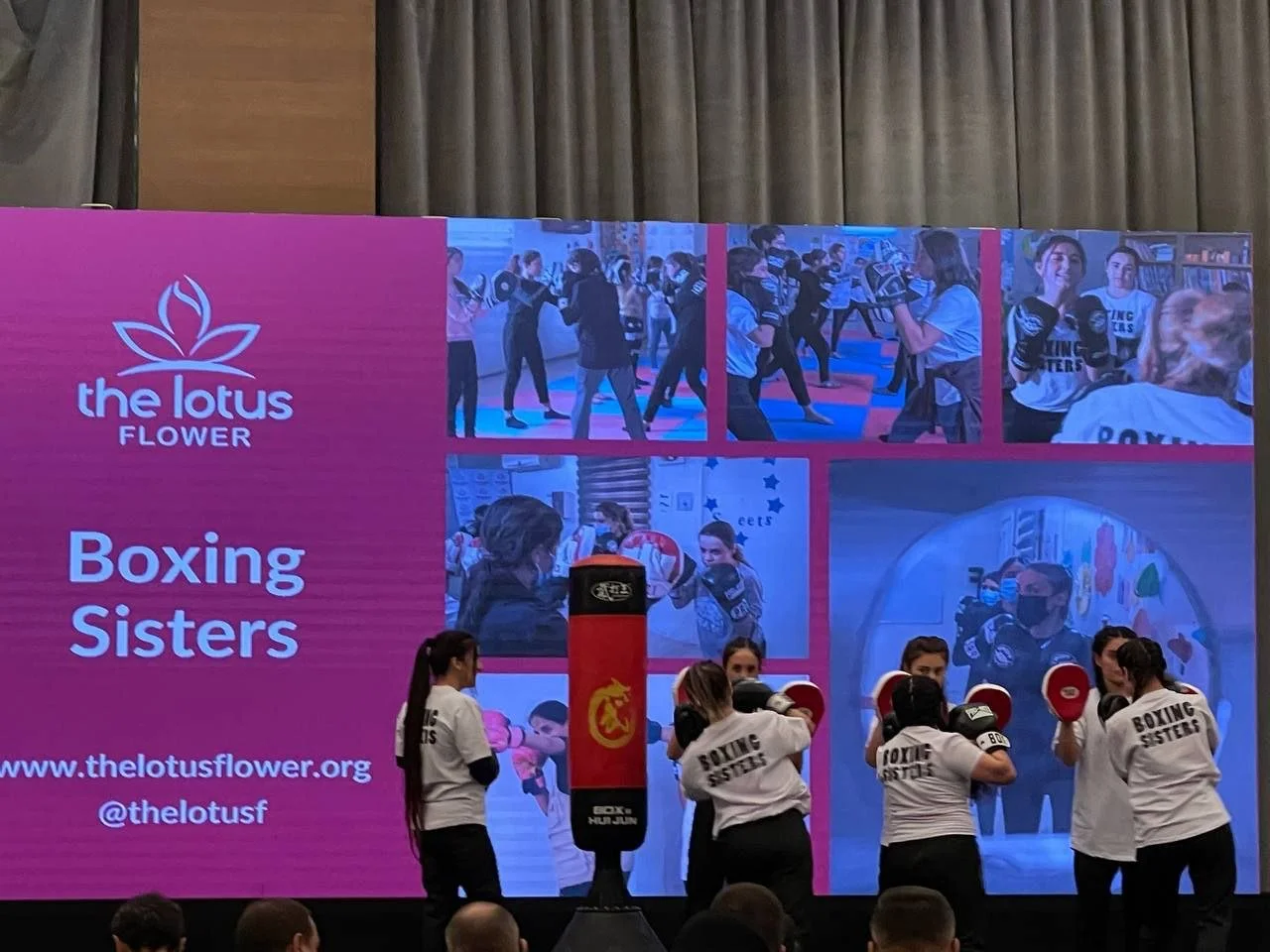
Sisters’ Stories: “Boxing made me feel better"
Zhiyan is a teenager from Sinjar who has been living at Essyan camp since the conflict in the region.
As a young girl whose whole life has been set against the backdrop of conflict, she says: “Our life was very different before displacement. We felt safe and secure, but now at the camp I have concerns about the future and how life can go back to what is was. We do not know how long we will be here.”
Just like so many other young people in camps, Zhiyan’s mental health has suffered badly over the years, and so she decided to sign up for the Lotus Flower’s boxing programme. “I always wanted to box, and before joining the classes I did not feel good. But boxing made me feel better and gave me comfort. My body also feels more relaxed now.”
Zhiyan is one of the participants of our project with Medica Mondiale, the women’s rights and aid organisation. Over the past few months we have been providing our Boxing Sisters training and self-defence for girls, along with literacy classes and awareness sessions on gender-based violence for women of all ages.
The project at Essyan is designed to improve vulnerable girls’ mental and physical health and to help them heal from years of trauma and upheaval. We also aim for the literacy classes to improve their educational development and employability, while the sessions provide a safe and welcoming environment where women and girls can bond and learn together. In addition, up to 320 family members have also been attending awareness sessions on key topics.
Speaking of the benefits she has personally experienced, Zhiyan adds: “My behaviour has changed towards my family since I joined the classes, and I have learned many new skills. I hope others can get the chance to join and develop their skills too. My hopes for the future are peace and safety for all.”
Our Boxing Sisters project has become one of our most popular programmes over the past few years, and we would love to keep on growing it – so do support us if you can!
can you Help Girls heal?
Even a small amount can make a big difference…
Our new self-care project for staff working with the vulnerable
As well as directly reaching displaced women and girls through our work, we believe it’s important to support other organisations and agencies working with ISIS survivors and victims of gender-based violence.
As a result, we recently started a new project to deliver mental health support and self-care workshops to NGO staff, community leaders and activists who have such important roles in enabling victims to recover and rebuild.
The project, in partnership with HÁWAR.help.e.V, will provide a safe space and support network for exchanges about the social and emotional challenges staff face in their daily work, as well as capacity-building seminars on improving responses for survivors of the ISIS atrocities.
Until now, there have been no programmes to support staff in this way, and many of those consulted said they often feel overwhelmed or alone in their work. The project aims to make staff feel stronger, less isolated and better equipped to support the critically vulnerable.
So far, self-care workshops that have taken place include sessions on relaxation techniques, sleep hygiene and art therapy. Additionally, there will be capacity-building training in gender-based violence response and case management, as well as protection principles, Psychological First Aid (PFA), communications and networking skills.
The project has made a strong start already, and we’re looking forward to seeing the results it brings those who are doing such incredible work in the community…
CAN YOU SUPPORT US?
Even a small amount can really make difference to our work supporting vulnerable women and girls
Sisters' Stories: ‘It was my dream to read books and write letters'
Shukriya is a 50-year-old Syrian refugee whose husband sadly passed away several years ago following an accident at work. As a single mother of two, she found life became harder and harder, especially as the conflict in her home country intensified. “The forces began attacking protesters and killing people, and then the government began forcing men and boys to join up. That’s when I decided to leave the country. I couldn’t put my son’s life in danger, as he and my daughter were all I had.”
After fleeing, life in a Kurdistan refugee camp was just as hard. “All three of us were suffering from loneliness and anxiety,” Shukriya adds. “We never left our house, and didn’t notice we were actually getting sick.”
One day, she heard her neighbours talking about the Lotus Flower’s projects. “They said the training and courses had helped them forget what had happened to them and added a little colour to their lives. So I decided to give it a shot myself. I knew I could stand on my two feet again, but I needed help to do so.”
Shukriya enrolled in our awareness sessions which she says “helped me a lot,” as well as Arabic lessons. “I knew how to speak Arabic but I could read nor write, and it was one of my biggest dreams to do so,” she says. “I wanted to be able to read books to write letters and so on - and I reached my goal at the age of 50.”
She has been attending various courses for three years now, and adds: “I will continue to do so because I love improving myself and I love the things I learn. My thanks go to the Lotus Flower for their hard work with us.”
As you can imagine, it gives us such great joy to see women like Shukriya achieve their ambitions while also beginning to heal and rebuild their lives…
Help us reach more women like Shukriya
It costs so little to support our women and girls’ literacy classes…
Watch our Peace Sisters explain UN Resolution 1325
We were so proud to see our Peace Sisters put together a new video which explains what UN Resolution 1325 is – and how it impacts on women and girls in peacebuilding and mediation efforts.
As you can see in the video below, UN Resolution was issued in 2000 to try and put an end to violations against women during and after armed conflicts and wars.
The Resolution decreed that women should be protected against any abuses of their rights and that they should be enabled to have full participation in decision-making processes that shape their lives.
Watch the video below to see our Peace Sisters explain it…
The video was made as part of our Peace Sisters project which is funded by FCDO in partnership with Cordaid and its Women Voices First programme. The programme has seen the group trained in mediation and conflict resolution, leadership and critical thinking, as well as confidence-building skills and advocacy for women’s rights. It’s also one of our first projects to focus on out-of-camp locations, where there is known to be huge unmet need, as well as divisions across communities.
We’re so proud of the phenomenal work the Sisters are continuing to deliver….
Our Peace Sisters lead workshop for religious leaders
A group of our Peace Sisters have shown how much progress they have made during the project by delivering a recent workshop for influential religious leaders.
Although such a move might have been considered impossible in times gone by due to strict societal norms restricting women’s involvement in public life, the participants led a session which stressed the importance of religious messaging in eliminating violence against women and girls.
The workshop in Zakho district was attended by many representatives from different religions, including mullahs and priests, and resulted in useful discussions on the need for leaders to advocate for women's rights and non-violence.
This particular round of Peace Sisters is funded by FCDO in partnership with Cordaid and its Women Voices First programme, and has seen the group trained in mediation and conflict resolution, leadership and critical thinking, as well as confidence-building skills and advocacy for women’s rights. It’s also one of the first projects to see us focus on out-of-camp locations, where there is known to be huge unmet need, as well as deep-rooted divisions across different communities.
Fully supported by the Lotus Flower, the Peace Sisters chose to implement the workshop themselves as one of a number of community initiatives they are delivering in Zakho and Al-Hamdaniya before the project concludes. The initiatives are all designed to promote gender equality and enhance social cohesion and peacebuilding, while focusing on the important role that women and girls can play in decision-making processes.
We’re so proud of the Sisters’ phenomenal achievements so far, and the way they have worked so hard on the project goals…
Support
our
projects
Help us give more women a seat at the table…
Our Founder speaks at Giving Women conference on mental health
Earlier this month, our founder and CEO Taban was honoured to speak at Giving Women’s Annual Conference in Geneva, which was titled: Mental Health – Not Just a First World Problem.
In a panel called ‘Triggers and Treatment’, which was moderated by Giving Women founder Atalanti Moquette, Taban spoke about her own past struggles, saying: “Throughout my life I’ve had different stages where mental health has been a big crisis for me, and I’ve secretly learned how to cope with it. I’ve been forced to secretly learn, because of the stigma it carries. In my culture it’s not something you talk about – if you do it means you’re crazy.”
Taban also told how her own issues ensured that mental health provision has always been at the core of the Lotus Flower, adding: “It made me realise, ‘what do I do to stop another woman or girl from experiencing this?’ I really do not want them to go through what I’ve gone through.”
On the panel, Taban spoke alongside Raj Mariwala, Director of Mariwala Health Initiative, Rasa Dawson, the Chief Development and Communications Officer at StrongMinds, and Pieter Ventevogel, Senior Mental Health & Psychosocial Support Officer at UNHCR.
Asked to expand further on our work on mental health, Taban explained our strong holistic approach, which brings women and girls together to heal through shared experiences, such as our Boxing Sisters programme. “We needed to find a way to break the stigma and allow them to channel their anger and emotion through a physical platform.”
Another topic of conversation was men and boys’ mental health needs, which are still seldom discussed or tackled. “It’s the full cycle, and about including the whole community,” Taban said. “From that, we said what about the youths over there who are ignored? Suicide rates amongst the young have been really increasing so we started our Youth Suicide Prevention project.”
It was a really interesting debate, and you can watch it in full right here…
Support our mental health work
Help us make a difference…
Sisters’ Stories: "I can now stand for myself as a woman and be proud of who I am"
Nuha is a 40-year-old refugee who fled from Syria two years ago and moved to Duhok city.
As a single mother of two children, she found she often felt overwhelmed and unsure where to turn for support. “I’d sometimes feel so lonely and depressed,” Nuha says. “I felt like I was goalless, and there were no opportunities to learn something new.”
A few months ago, she applied to join our Peace Sisters & Brothers project, which is training 50 women and men to become peace mediators in their own communities.
Funded by Deutsche Gesellschaft für Internationale Zusammenarbeit (GIZ) GmbH on behalf of the German Government, the project is designed to help restore harmony within fractured communities, focusing on conflict resolution techniques, women empowerment, cooperation and integration, plus confidence-building techniques. Participants come from different religious and ethnic backgrounds, including Yazidi, Christian and Muslim.
A Christian herself, Nuha has found the experience to be incredibly positive so far. “I’ve been delighted by the effect of this training on my personal life,” she says. “The mediation training helped me improve my skills and mental health, as well as my communication skills and Kurdish language. I’ve also met many warm-hearted people and made new friends.”
Nuha adds: “As a divorced woman, I felt left out, and like society has forced rules on me, or that I have disappointed people – when maybe it wasn’t even my fault. I decided to join the project as I wanted to learn how to be a mediator and to solve problems. Most importantly I want to show the world that the cause of a problem is not always a woman. I have been blamed for my, my previous husband’s and my children’s mistakes. I want to show them that just like women, men also make mistakes.”
The project will continue until the end of this year, and Nuha continues: “I feel I can now stand for myself as a woman and be proud of who I am. I am strong and independent and most importantly, I now know how to prevent my kids from arguing, and how to be a better mother for them.
“I totally believe that this project improves integration and strengthens social cohesion among communities. I’ve learnt that there is light at the of the tunnel – if we have desire to change. I also came to the conclusion that a woman who is OK with being alone is a powerful woman.
“I want to thank everyone who supports us, and tries to provide us with better lives.”
We’re so glad to be able to reach women like Nuha on this project, and hope it’s just the very beginning…
Support our peacebuilding work
Can you help us provide more life-changing opportunities to women like Nuha?
The impact of our second Men & Boys' Trauma Project
Earlier this year, we started a second run of our pioneering Men & Boys’ Trauma Project, and in a recent impact report compiled by our team, its effects have been shown to be hugely positive for participants.
The project was conducted at Domiz 2 camp for Syrian refugees between March and the end of June this year, and it was again delivered in partnership with Khaima. Designed to encourage healing through the sharing of past traumas, the programme is incredibly rare in the region because very little holistic support is available for men and boys – despite them enduring terrible atrocities in recent years and being displaced from their homes. The project included the following activities:
70 art therapy sessions
The aim of these sessions was to improve overall wellbeing of participants through the expression of their feelings using art in a safe, secure environment. Activities included free drawing, colour mixing, drawing their feelings, making collages and group artwork.
70 English language classes
Classes were held at both Beginner and Intermediate level, and introduced participants to new language skills through different learning methods, including games, fun group activities and video.
16 group counselling sessions
These concentrated on topics such as the basics of mental health, stigma around psychological disorders, common issues (eg. depression, anxiety and PTSD), as well as different treatment approaches.
15 social awareness sessions
These were aimed at raising awareness about common issues among the community. Topics included: positive masculinity, anger management, the importance of social relations, early marriage, gender-based violence, the prevention of sexual exploitation, special needs provision and technology addiction. Our psychologist and social worker also visited the families of each participant, with 53 individuals benefitting from discussion of these sorts of topics.
38 individual therapy sessions
These were provided for men and boys who were deemed to be in need of additional psychological support to process trauma.
8 business training sessions
This was a new addition to this iteration of the project, added at the request of participants from the first round. Training included practical sessions and topics included business management and small enterprises, plus smart goals and sales strategies.
Alongside all of these activities, we also conducted regular entertainment activities, including a talent show and exhibitions of their artwork. Finally, we celebrated the end of the project with a special trip and ceremony, in which participants were given certificates and joined together for singing and music.
The impact of the project has been incredible, and here are just a few of the comments from participants.
Rakan
“This project has made me feel better mentally and socially. It’s great to receive psychological and social awareness sessions and explore my feelings through art – I’ve never done this before! During the project, I have also taken English language and art therapy classes and other different awareness sessions, which has made me more knowledgeable and developed my skills. I love being here and like to see an NGO giving focus to men and boys too when it comes to mental wellbeing. I hope these opportunities continue to involve other refugee men and boys.”
Haji
“I really like being part of it and it's incredible to spend my time learning things like art, English and participating in awareness sessions, and especially the individual mental health counselling. The project not only positively affected me, but also my family, because the way I communicate with them now and solve problems is very different. All of this has pushed me to continue and become more excited for what each day in the project brings.”
Siraj
“I took part primarily to learn English and meet new people. Making friends during the classes made me feel much better and more relaxed. I recommend that all of the community, especially men, participate in these sessions to learn and spend their free time on something worthwhile.”
Support traumatised men and boys
We are in desperate need of more funding to keep this work going. Can you help?
Mental Health Awareness Month: How Loza overcame social anxiety
October is Mental Health Awareness Month, and as always, we’re working hard to support the psychological wellbeing of hundreds of displaced women, girls, men and boys.
One of those we’re happy to have been able to reach in recent months is Loza, a young Yazidi who is originally from Sinjar. She has been living with her family at Essyan camp ever since ISIS attacked their village in 2014 and they had to flee to the mountain for safety.
Being forced into displacement has understandably had very negative impacts on Loza’s mental health, and she says: “Before I came to the camp I would spend all my time in the house helping my mother. I had social anxiety, and was very shy and scared to communicate and make friends.”
But since taking part in the Lotus Flower’s Youth Suicide Prevention project, which is supported by the German Consulate in Erbil, she has found her outlook on life has changed for the better.
“After joining the project and participating in the activities, my mental wellbeing has improved and I feel a lot better. I have been spending my time coming to the centre to participate in training, then I go home in the afternoon to help my mother and study all the things I’ve been taught to improve my skills.
“I have become aware of the signs of mental health issues, including recognising them and learning how to deal with them in daily life. Overall, I have become more optimistic, and happier.”
Project activities have include art and music therapy, as well as yoga and mental health counselling.
Having also had the chance to learn English through the programme, Loza adds: “It's beneficial for young people to join such projects, because they will gain more knowledge, become more social, make new friends – and have fun. These types of projects can contribute to youths’ mental health wellbeing positively, and they are very important for us to improve our thoughts and understanding. We enjoy our time together.”
Loza now aims to become fluent in English, and to improve her computer and software skills – and we’ll be right behind her as she pursues her ambitions!
Support our mental health work
We badly need funding to reach more traumatised youths and conflict survivors. Can you support us?
Our founder speaks at major feminist development conference
Our founder Taban was honoured to take part in an important conference in Germany recently, which was hosted by the Federal Ministry for Economic Cooperation and Development (BMZ).
The conference, ‘Feminist Development Policy – Transforming International Cooperation’, was organised as a response to multiple global crises, with the objective of exchanging ideas on best practices, approaches and elements of feminist development policy.
As an activist representing women and girls in the MENA region, Taban was asked to illustrate the crucial role women play in peace and dialogue processes, and to share her vision of a feminist development policy.
Taban spoke of the importance of including men and boys in efforts to encourage women’s participation, and told the audience: “There are great men on the ground who are supporters, so what you do is get them on board, and once they’re on the journey, other men will slowly start walking forward.”
She added: “We have to remember that men have hearts and minds, and we have to win them over so they join us on this journey.”
Taban spoke about our Boxing Sisters project as an example of gaining male acceptance. “I never thought I’d be taking a popular boxing programme to Kurdistan, working with a very conservative society that does not really accept boxing for women. But we did it correctly, and in a safe way through our women’s centres. So the men didn’t feel threatened at all.”
The conference also saw a keynote address by Svenja Schulze, the German Federal Minister for Economic Cooperation and Development, who said: “Feminism is a conviction. And equality is a human right. The purpose of a feminist development policy is a society of the free and the equal, a society in which all people enjoy equal participation in social, political and economic life and are able to exercise their human rights. So this is about far more than ‘a policy by women for women.’
“It will take determination, convincing arguments and readiness to stand up against discrimination and its structural causes – time and again. But I’m sure that you here in this room, and also those participating online, have this determination and also the courage.”
It was great for the Lotus Flower to be in the room and to be part of these essential conversations…
Support us
As little as £10 can help us train more women and girls to be peace activists and community leaders
Women and girls graduate from our boxing and literacy project
You may remember that we started an exciting new project with Medica Mondiale earlier this year, which sees us providing our popular Boxing Sisters training along with literacy classes and awareness sessions on gender-based violence.
Fast forward a few months and the first group of women and girls have just completed the course – and they celebrated in style this week with a special ceremony, certificates, and a beautiful cake.
The six-month project at Essyan camp is designed to improve women and girls’ mental and physical wellbeing, and help alleviate years of trauma caused by conflict and displacement. It has been incredible to watch the girls grow in confidence while learning key boxing and self-defence skills, as well as finding channels to process hidden grief, anger and confusion.
We’ve also loved seeing women of all ages learn to read and write – some for the very first time in their lives. The literacy and English language classes also aim to boost participants’ educational development and livelihoods prospects, while the awareness sessions are increasing community understanding of women’s rights in relation to violence and abuse. Up to 320 family members are also attending these sessions.
Founded in 1993, Medica Mondiale is a leading women’s rights organisation which supports women and girls who have experienced sexualised wartime violence, working with local, female-led partner organisations to achieve its goals. It also strives to assert women’s rights and raise awareness of the consequences of violence across all of society.
We’re really enjoying working together, and are now continuing to provide boxing, literacy, English and awareness sessions for the second cohort of women, girls and their families. Stay tuned for more updates about their progress soon!
Help us reach more women and girls
Just £5 can help buy the books we need for one woman or girl taking our literacy classes.
'An Evening with the Lotus Flower' takes place in London
We were so pleased to welcome a wonderful group of supporters, friends and donors to a special fundraising event in London this week.
‘An Evening with the Lotus Flower’ saw us join together for an intimate evening of inspiring talk and conversation, and to raise much-needed funds for our women’s centres and projects. The night was hosted by Clarksons, whose fantastic team kindly gave us access to their stunning event space, as well as supporting us on the night and treating us all to delicious food and drink.
During the evening, our founder Taban told her emotional story of surviving genocide as a child, and why witnessing the ISIS atrocities in 2014 prompted her to give up her career and start the Lotus Flower. “There was no way I could go back to a 9-5 job,” she said. Explaining the ethos behind the organisation, Taban continued: “The whole premise in our centres is that we help women and girls heal, learn and grow. That’s the main focus, and since 2016 we’ve managed to help 44,000 women and girls – half of those directly.” She also spoke of what makes the Lotus Flower’s approach different, adding: “We have one golden rule – we only hire local people; that’s what makes us very unique.”
We also heard from, Sophie Pelka, Co-Founder of the Give It Forward Trust (GIFT), one of our most recent donors. Explaining why the Trust felt compelled to support the Lotus Flower, she said that strong leadership is key. “Taban is an incredible leader, especially in serving vulnerable women and girls. And as a child genocide survivor herself she knows about the trauma and knows how to help these women heal and grow.”
Sophie also spoke about the importance of mission alignment as a donor, adding: “GIFT and the Lotus Flower are the perfect match.” And pinpointing our impact-driven approach, she said: “Every programme implemented by the Lotus Flower is designed to meet the beneficiaries’ specific needs. They are at the centre of the organisation and their feedback is constantly monitored, which ensures impact.”
Sophie also said she recognised “the magic” in the Lotus Flower, saying: “Many of the women and girls helped by the Lotus Flower become programme leaders themselves, creating this virtuous circle that we aim to find. I see many organisations in my work but few are as efficient and impactful as the Lotus Flower. We are privileged to be involved with such an amazing organisation.”
Another supporter who spoke on the night was Atalanti Moquette, Founder of Giving Women, a philanthropic network which has provided invaluable support to the Lotus Flower through mentorship, professional knowledge and expertise. Atalanti said: “When I met Taban, I saw she was listening to the needs of the people, and recognising the importance of mental health. Surprisingly, very few people talk about this, but the trauma many of these women have been through is horrendous.
“The Lotus Flower went into the community and asked, ‘what is it that you need? How can we support your healing?’ The people working in the camps are from the local community, they speak the language and understand the cultural sensitivities. For us, the Lotus Flower ticked all the boxes and we felt it could go beyond the camps in northern Iraq.”
Our final speaker on the night was Simon Butler from Migrate Art, a long-standing supporter and friend. Having visited our projects in Kurdistan in 2019, Simon said: “What the Lotus Flower does is incredible, and going out to see it was one of the most profound experiences of my life. My view of that region of the world changed completely.”
A huge thank you to everyone who came along on the night to support us – we just couldn’t do what we do without you!
Our founder Taban speaks at Action Network on Forced Displacement panel
Our Founder and CEO Taban Shoresh was honoured to take part in a major panel on feminist refugee policy in Berlin recently.
As a guest speaker at the annual meeting of the Action Network on Forced Displacement – Women as Agents of Change, Taban joined Svenja Schulze, the Federal Minister for Economic Cooperation, as well as Anila Noor from the Global Independent Refugee Women Leaders Network.
The engaging talk considered how refugee participation can be strengthened and how organisations led by displaced people can shape international agendas and discussions – especially when it comes to women empowerment.
Formed by BMZ in 2020, Taban was delighted to be asked to join the Action Network, which currently has members from more than 10 countries. It aims to raise the visibility of women in displacement as well as strengthening their rights and opportunities for economic, political, and social participation, while also serving as an example for grassroots engagement, participation, and inclusive leadership.
The Network also seeks to reflect on the systems of power and inequality and the role of displaced people facing intersectional challenges such as conflict, climate change, and economic crisis.
Taban was thrilled to take part and is very hopeful it will lead to many more fruitful discussions in future.
Check out our brand new in-camp library
We’re so happy to have opened our very first in-camp library for women and girls.
Thanks to the amazing support of Ideas Beyond Borders, which aims to advance liberty, science and reason in underprivileged areas of the world, we have been able to build and decorate this beautiful new facility in Essyan camp. It means that women and girls can now gather together to choose and read a range of books in a safe and welcoming space.
Many of them have learned to read and write in our educational classes, which makes the library even more symbolic - and empowering.
We’re delighted with what has been achieved - but if you are based locally and have any books you can donate to us, please do let us know by emailing info@thelotusflower.org. The more the merrier!
We’ll just leave you here with some of the photos of the library, which we’re all so proud of…
Sisters’ Stories: How Abeer’s mental health has improved
Abeer is a teenager from Syria who became a refugee back in 2013, when she was just a young child.
The long-running war means she has lived in a small tent at Domiz 2 refugee camp with her six siblings and father for around 10 years, and so most of her memories are of living in displacement.
Always keen to learn, Abeer heard about our project with The Big Heart Foundation and NAMA, which is providing mental health support and awareness of gender-based violence, as well as financial support and business mentorship for new and existing women-led small businesses.
She decided to take part in our mental health counselling, as well as awareness-raising sessions and seminars, which have focused on topics around gender-based violence and abuse, early marriage and women’s rights.
Now Abeer says: “I wanted to participate in this project because I felt down mentally, and I wanted to feel better. I joined group sessions offered by the psychologist, and I encourage people of my age to be part of this because it can help you understand your feelings and how to deal with the problems we face as women and girls in refugee camps.”
In the project, our mental health sessions have covered multiple topics, including anxiety, depression, suicidal thoughts, self-care, art therapy and PTSD. Earlier in the year, we also ran a campaign to raise awareness of bullying, which came about after we received feedback from project participants that such harmful behaviour has increased inside camps, especially toward women and girls.
Another part of the program has seen a group of selected women take part in business management training, while they will also receive small grants to start businesses of their own choosing. During the training, business specialists concentrated on enhancing their skills in online marketing, financial management and networking.
Additionally, we have this year provided financial support to 10 existing women-led businesses in Rwanga and Essyan camps, which had suffered due to economic hardship caused by the pandemic. This has allowed them to restart their businesses and purchase new stock and essential items needed to get back on track.
We’re so glad the project is having such positive impacts right across the board…
Our new Peace Sisters and Brothers project begins
Another major new project for the Lotus Flower is now underway!
In our groundbreaking ‘Peace Sisters and Brothers’ initiative, women, girls, men and boys are being trained as peace mediators in their own communities. The new partnership is funded by the program, ‘Strengthening the Participation of Women in the Peace and Rehabilitation Process in Iraq’ (SPW), of Deutsche Gesellschaft für Internationale Zusammenarbeit (GIZ) GmbH on behalf of the German Government.
Designed to help restore harmony within fractured communities in the Kurdistan Region of Iraq, the project focuses on conflict resolution techniques, women empowerment, non-violence, cooperation and integration, plus confidence-building techniques.
While the Lotus Flower has previously run Peace Sisters as one of the only known schemes in the region to focus on women becoming mediators, defenders and active community leaders, this is the very first iteration of Peace Brothers. We believe it is vital to ensure that men support women’s equal participation in peace processes in order to bring far-reaching positive change.
The Duhok-based project, for 25 Peace Sisters and 25 Brothers aged 18-35, has now begun with mediation training, conducted by trainers who are certified in conflict resolution techniques. The participants come from various different religious and ethnic backgrounds, and include Yazidis, Christians and Muslims from IDP, refugee and host communities.
During the programme, they will also complete soft skills training, including leadership and communications skills, critical thinking and public speaking. They will additionally take part in workshops on UN Resolution 1325 on Women, Peace and Security, which calls for the increased participation of women in peace and security efforts. Another part of the project sees research being conducted around Resolution 1325, which will form a report on its status in the region.
Towards the end of the project – which runs until late December – the Peace Sisters and Brothers will hold community consultation workshops to determine peacebuilding initiatives that are needed in the local area. With our support, they will then implement 10 community initiatives that benefit many hundreds of people in their communities.
Lastly, a final ceremony will be held to serve as graduation from the project, with research outcomes also being presented.
We’re really excited about this intervention and believe it will not only increase capacity for women and girls’ participation in peacebuilding processes, but also improve their ability to take part in social and economic regeneration, reduce violence and discrimination against them, and give men and boys the tools to contribute to gender transformative peace.
Our Founder Taban says: “We are thrilled to have launched this exciting new project, and are very grateful for the support of both GIZ and the German Government. It is not only a timely and much-needed intervention in an area which has been destabilised by conflict for many years, but one that is also pioneering in its approach.
“By directly putting women and girls at the heart of mediation processes and improving their capacity for leadership in their own communities, we hope to bring sustainable change that will benefit thousands. We believe that by including men in the process of elevating women and girls’ peacebuilding roles – which itself is groundbreaking in this region – we will accelerate this change further.”
We’ll keep you up to date with the project’s progress!
The Lotus Flower is awarded the Care Partnership Prize 2022
The Lotus Flower is incredibly honoured to have been awarded the Care Partnership Prize for 2022.
The prize is given by Care International every two years to a partner organisation which it says “works in a special way and with exceptional commitment to help people in need.”
During a special ceremony in Bonn, Germany, we were recognised for our achievements in creating new perspectives for internally displaced women and girls, and for supporting them with psychosocial help. Care also noted that, “at the political level, the organisation is committed to asserting the rights of women and girls as well as social minorities in Iraq.”
Speaking at the ceremony, which was attended by our Founder Taban Shoresh and Regional Director Vian Ahmed, Mayoress of Bonn Katja Dörner said: “It is particularly important to me to stand up for gender equality locally and globally. We do this as a city with our equality body and a systematic equality plan. We also work closely with women's groups in Bonn and are involved in networks such as ‘gender@international Bonn’. I am pleased that an organisation that is characterised by such special commitment in this field is being chosen. My heartiest congratulations to the Lotus Flower.”
Meanwhile, Karl-Otto Zentel, Secretary General of Care Germany, said: "The Lotus Flower is an outstanding organisation that offers women and girls a perspective in a seemingly hopeless situation. Women and girls grow, learn and find shelter. At Care, we know from decades of experience that progress made for women is progress made for their families and communities. I am all the more pleased that we are able to present the partnership award to the Lotus Flower today.”
During the event, a video was shown to audience members charting the Lotus Flower’s story, and why our Founder Taban was driven to start the charity. In a powerful speech, she told guests: “This award is a great recognition. We work every day to give women and girls the opportunity to stand on their own two feet and we are grateful that Care is a big part of that. We look forward to tackling further projects together that will have a positive impact on the lives of women and girls in Iraq.”
Our Regional Director Vian also took part in a panel on women as agents of change during difficult times, while both she and Taban visited Care’s Advisory Board in Germany and gave insight into working in Kurdistan as part of a women’s organisation. The ceremony was also attended by Prof. Dr. Winfried Polte, President of Care Deutschland, and Bettina Metz, Managing Director UN Women Deutschland.
In conclusion, Care commented that the organisation is “proud to have such a strong and dedicated partner” as the Lotus Flower - and the feeling is certainly mutual!
Check out more photos in the gallery below - all kindly taken by Jennifer Zumbusch.









Sisters’ Stories: ‘I can see I am improving every day’
It’s often hard to imagine what some of the women and girls we support have been through – and Belar* is no exception.
A Yazidi woman aged 18 who is originally from Sinjar, she came under ISIS control as a young girl following the devastating attacks of 2014. Horrifically, she suffered many forms of violence before eventually escaping her tormentors and finding safety at Rwanga IDP camp.
Inevitably, the ordeal severely impacted on Belar’s mental health, and she has struggled to come to terms with it for years. As well as continuing her education and working to provide for her family, Belar recently signed up to our Youth Suicide Prevention project, which supports young survivors impacted by the conflict.
The project – in partnership with the German Consulate in Erbil – was designed in response to rising mental health issues in IDP and refugee communities as a result of the pandemic. Following repeated lockdowns and increased economic uncertainty, many youths have been struggling with conditions such as depression and anxiety, especially with extra pressures on already limited resources. Through the intervention, our team offer psychological counselling for participants and their families, as well as art therapy, music, yoga and English language classes.
“I especially love the yoga classes, and I can see I am improving day by day,” says Belar. “These activities also help us change our thoughts and avoid thinking negatively. I have had suicidal thoughts before, but with the Lotus Flower’s support I’ve been able to rejoin the community and get that idea out of my mind.”
Recently, the first group to complete the Youth Suicide Prevention project celebrated their achievements with an inspiring graduation ceremony, which saw them receive certificates and sing and dance together.
We’re so please at how this program has been going so far, and will be bringing you many more updates as it continues…
* Belar’s name has been changed to protect her identity
Join our new Peace Sisters and Brothers project
Later this year, we’re going to be starting a very exciting new project, which will see us train a new cohort of Peace Sisters - as well as our first ever group of Peace Brothers.
We are now looking to recruit 50 motivated youths (25 males and 25 females) from Duhok city to take part in the project - and if you would like to be considered, you just need to complete the form here.
The groundbreaking project will involve capacity-building training in mediation and conflict resolution skills, as well as the opportunity for youths to lead initiatives that promote peace and social cohesion in Duhok.
With kind support from Deutsche Gesellschaft für Internationale Zusammenarbeit (GIZ) GmbH, the project will bring together youths from different ethnic and religious backgrounds – including Muslim, Yazidi and Christian, as well as those from IDP, refugee and host communities.
Past iterations of our Peace Sisters project have been extremely well-received, with women and girls trained to become peace defenders and active community leaders, learning key skills in critical thinking, confidence-building, conflict resolution and cooperation.
One previous participant, Mariam, said of the project: “I’ve learned that the solution for conflict is not force or creating more conflict – mediation can be the ultimate solution. I am also now more open to accepting different opinions, new faces and the new world we live in. Now I understand that we as women are capable of anything, any time.”
For the first time, we will be offering the same opportunity to new ‘Peace Brothers,’ so that young men can also play a part in leading peace and conciliation efforts in the region.
We look forward to receiving your completed form if you’re interested in signing up!

